How the Pulpit Became Political
Mystic Mondays January 9, 2017"Remember, you yourselves were once strangers in the land of Egypt." Ex. 22: 21Today I preached a sermon at the church where I am currently serving as an interim pastor. I was preaching on the first part of their new mission statement, "Welcoming all, as God's people, on our journeys of faith." Speaking to the first phrase, "welcoming all" I reminded my congregation that it is an essential part of the Judeo-Christian narrative to be welcoming to the stranger, the different, the alien and the outcast among us.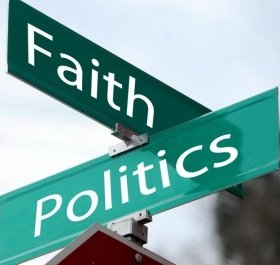 In any other context and time I think my sermon would have been heard as a good reminder to what makes us church. It would have been heard as a purely spiritual message of how we learn to live more deeply into our Christian character. It would have been pulpit preaching at its most normative.But a strange thing has been happening in my sermons. Despite no manipulative maneuvering on my part most of my sermons feel like they have a political angle to them. The pulpit is feeling political no matter what I say.I have for years offered the same benediction at the end of the service. It used to be a feel good benediction and charge to the congregation to go out and live the words that we had prayed, sung and heard in the service. But now not so much. They sound political. They sound like a charge to go into battle.I never intended it this way, but I can hear the words in my own head. With my arms raised in the typical blessing style I say, "Strengthen the fainthearted, support the weak, and help the suffering," and I can't help but feel like I am making a political statement. I can't help but to think I am drawing a line in the sand and saying, "Mr. Trump you can't steal this from us. We are going to fight you on this one."
In any other context and time I think my sermon would have been heard as a good reminder to what makes us church. It would have been heard as a purely spiritual message of how we learn to live more deeply into our Christian character. It would have been pulpit preaching at its most normative.But a strange thing has been happening in my sermons. Despite no manipulative maneuvering on my part most of my sermons feel like they have a political angle to them. The pulpit is feeling political no matter what I say.I have for years offered the same benediction at the end of the service. It used to be a feel good benediction and charge to the congregation to go out and live the words that we had prayed, sung and heard in the service. But now not so much. They sound political. They sound like a charge to go into battle.I never intended it this way, but I can hear the words in my own head. With my arms raised in the typical blessing style I say, "Strengthen the fainthearted, support the weak, and help the suffering," and I can't help but feel like I am making a political statement. I can't help but to think I am drawing a line in the sand and saying, "Mr. Trump you can't steal this from us. We are going to fight you on this one." And the funny thing is this happened with no change on my part. My preaching hasn't changed at all. I am preaching the same messages I have preached for a twenty years. But now they sound different. The context has changed. Our ears hear a different message. New images pop up in our heads that weren't there before.When we sing, "Jesus loves the little children, all the children of the world, red and yellow, black and white..." it doesn't sound so innocent anymore. It sounds like we are taking a stand. It sounds like we are facing off with a political figure and movement. It sounds like we are marching into war.But WE haven't changed the words. Mr. Trump changed the context (or at least exposed a hidden, festering underground people).I say, "Jesus calls us to honor the dignity of every person" and it sounds like I am calling Trump out for mocking a disabled reporter.I say, "Remember, we were once strangers in the land of Egypt" and it sounds like I am protesting the policies of Trump and his supporters.I say, "Jesus had a way of treating each person like a human being," and it sounds like I am looking for a way to embarrass this locker-room-talking, pussy-grabbing president elect.I say, "We are our brother's and sister's keeper," and it sounds like I am speaking specifically about the refugee and immigration crisis.I say "Repay no one evil for evil," and it sounds like I saying, "Don't stoop to Mr. Trump's lows."Some may accuse me of suddenly making my pulpit political and sticking my nose in where it doesn't belong. But I am struck by the fact that nothing has changed for me. I am still preaching the same gospel message:"Love your neighbor as yourself.""Take care of the stranger among you because once you were that stranger and God took care of you.""Practice humility and mercy toward each other.""Forgive us our debts as we forgive our debtors.""Honor everyone."I never intended for this to be political. But maybe that's the power of gospel. It doesn't care about the lines between religion and politics, convention and political correctness. The gospel just shines a light into dark places and exposes our fallen natures.
And the funny thing is this happened with no change on my part. My preaching hasn't changed at all. I am preaching the same messages I have preached for a twenty years. But now they sound different. The context has changed. Our ears hear a different message. New images pop up in our heads that weren't there before.When we sing, "Jesus loves the little children, all the children of the world, red and yellow, black and white..." it doesn't sound so innocent anymore. It sounds like we are taking a stand. It sounds like we are facing off with a political figure and movement. It sounds like we are marching into war.But WE haven't changed the words. Mr. Trump changed the context (or at least exposed a hidden, festering underground people).I say, "Jesus calls us to honor the dignity of every person" and it sounds like I am calling Trump out for mocking a disabled reporter.I say, "Remember, we were once strangers in the land of Egypt" and it sounds like I am protesting the policies of Trump and his supporters.I say, "Jesus had a way of treating each person like a human being," and it sounds like I am looking for a way to embarrass this locker-room-talking, pussy-grabbing president elect.I say, "We are our brother's and sister's keeper," and it sounds like I am speaking specifically about the refugee and immigration crisis.I say "Repay no one evil for evil," and it sounds like I saying, "Don't stoop to Mr. Trump's lows."Some may accuse me of suddenly making my pulpit political and sticking my nose in where it doesn't belong. But I am struck by the fact that nothing has changed for me. I am still preaching the same gospel message:"Love your neighbor as yourself.""Take care of the stranger among you because once you were that stranger and God took care of you.""Practice humility and mercy toward each other.""Forgive us our debts as we forgive our debtors.""Honor everyone."I never intended for this to be political. But maybe that's the power of gospel. It doesn't care about the lines between religion and politics, convention and political correctness. The gospel just shines a light into dark places and exposes our fallen natures. I don't even mention Trump by name from the pulpit, but it's as if he has found a way to get into the subtext of my sermons. I can't keep him out if I tried. He has written himself into every home and every person's subconscious. I didn't invite him. He pushed his way in.I am sorry Mr. Trump, I am not trying to single you out from the pulpit. You have singled yourself out with your behavior. And this gospel that I have been preaching is now pointing a great big ole' floodlight in your orange-ish direction. And despite your love of the limelight this is one light that doesn't make you look good. In fact it makes you look small, petty, and desperate.Mr. Trump you haven't changed me. I am a Christian minister. I will always be a Christian minister. Someday you may need my (or a colleague's) services. And my hope is that when your final day comes that I can say with integrity, as I do at many memorial services, "Well done, good and faithful servant. Enter into the joy of your Lord."But Mr. Trump I won't lie for you. My job is to preach the gospel. Your job is to make a good faith effort to live up to it. And then, on your final day, my job is to tell the story. Please give me a better story. I won't make it up for you. You have to live it first.
I don't even mention Trump by name from the pulpit, but it's as if he has found a way to get into the subtext of my sermons. I can't keep him out if I tried. He has written himself into every home and every person's subconscious. I didn't invite him. He pushed his way in.I am sorry Mr. Trump, I am not trying to single you out from the pulpit. You have singled yourself out with your behavior. And this gospel that I have been preaching is now pointing a great big ole' floodlight in your orange-ish direction. And despite your love of the limelight this is one light that doesn't make you look good. In fact it makes you look small, petty, and desperate.Mr. Trump you haven't changed me. I am a Christian minister. I will always be a Christian minister. Someday you may need my (or a colleague's) services. And my hope is that when your final day comes that I can say with integrity, as I do at many memorial services, "Well done, good and faithful servant. Enter into the joy of your Lord."But Mr. Trump I won't lie for you. My job is to preach the gospel. Your job is to make a good faith effort to live up to it. And then, on your final day, my job is to tell the story. Please give me a better story. I won't make it up for you. You have to live it first.
"Compassion, Brian, Compassion"
Mystic Mondays January 2, 2017 (Post-Vacation Edition)Compassion. That was the word that kept coming back to me as I crawled my way down the interstate during a wet winter snowstorm on the last day of my annual Christmas vacation.The vacation provided me with a much-needed reprieve from the whirlwind of swirling emotions that had sucked me in in the wake of the Trump phenomenon. Before my break I had an almost obsessive need to follow every unpredictable word, every 144-character presidential tweet, and every jolting cabinet choice that he was making.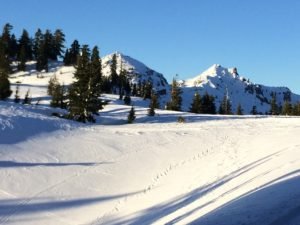 But for eight straight days--Christmas through New Year's--I stepped off the Trump treadmill and played with my two year-old grandson, shared holiday meals and goodies with family, snowshoed on the Crater Lake Rim under stars, and inexpertly plucked away at the six strings of my guitar, sometimes even making it sound like music.I am now sitting in a restaurant ironically named Heaven on Earth just off of Interstate 5 waiting for the two lines of parked cars to budge again after three wrecks ahead of us shut the interstate down. I am just hours from needing to make the transition from a rich diet of soulful refreshment back into a world that just one week ago had me trapped on a dizzying merry-go-round with Crazy World blaring on the speakers and the attendant explaining that there was no stop button on this ride.I fear getting back and stepping once again into the fear, the anger, the grief, and the cynicism that had grabbed me by the hair and would not let go. I fear that the peace, the goodness, and the beauty that radiated in me and around me on these glorious eight days of vacation will evaporate as fast as the first drops of rain on a sizzling patch of hot August pavement.But one word keeps nagging at me, nudging me and even pestering me a little. "Compassion. Step back into this crazy, confusing and frightening world with compassion," the voice seems to be saying. "You've fought with anger, biting sarcasm, and deep grief. But now it's time to arm yourself with compassion."
But for eight straight days--Christmas through New Year's--I stepped off the Trump treadmill and played with my two year-old grandson, shared holiday meals and goodies with family, snowshoed on the Crater Lake Rim under stars, and inexpertly plucked away at the six strings of my guitar, sometimes even making it sound like music.I am now sitting in a restaurant ironically named Heaven on Earth just off of Interstate 5 waiting for the two lines of parked cars to budge again after three wrecks ahead of us shut the interstate down. I am just hours from needing to make the transition from a rich diet of soulful refreshment back into a world that just one week ago had me trapped on a dizzying merry-go-round with Crazy World blaring on the speakers and the attendant explaining that there was no stop button on this ride.I fear getting back and stepping once again into the fear, the anger, the grief, and the cynicism that had grabbed me by the hair and would not let go. I fear that the peace, the goodness, and the beauty that radiated in me and around me on these glorious eight days of vacation will evaporate as fast as the first drops of rain on a sizzling patch of hot August pavement.But one word keeps nagging at me, nudging me and even pestering me a little. "Compassion. Step back into this crazy, confusing and frightening world with compassion," the voice seems to be saying. "You've fought with anger, biting sarcasm, and deep grief. But now it's time to arm yourself with compassion." But I want to make one thing very clear. This call to compassion is not a retreat from the ugly and dirty duty of fighting for what is right, good, just, graceful, and life-affirming. This is not a shrinking back from the messy affairs of religion and politics. This is not an abdication of our basic human responsibility to look out for the dispossessed, the marginalized, the minority, the immigrant, the outcast and vilified.This is just a recognition that anger, fear and cynicism are not the weapons that my soul most desires. I cannot let the poison that has entered our national bloodstream also poison my own soul. If a fight is on the near horizon I am no better than my perceived opponent if I resort to the same weapons that have had me so tied up in knots.Gandhi has been famously quoted as saying, "An eye for an eye and a tooth for a tooth just leaves the world blind and toothless." Fighting anger with anger gets us nowhere. Outbidding a fear-monger with just more fear leaves us all scared of our own shadows.I have had eight days of refreshment. I have nourished my soul with sparkling white wintry powder. I have been reminded of the importance of family. I have held loved ones close. I have laughed at silliness and cried at shared pain. And I have eaten Christmas delights until my eyes turned red. I like how this feels. I don't want it to go away. I don't want to be angry any more. I don't want to live in fear. I don't want to cynicism and sarcasm to poison my heart.But I do want to fight. And the voice tells me, "Compassion, Brian, compassion. You must fight with compassion."
But I want to make one thing very clear. This call to compassion is not a retreat from the ugly and dirty duty of fighting for what is right, good, just, graceful, and life-affirming. This is not a shrinking back from the messy affairs of religion and politics. This is not an abdication of our basic human responsibility to look out for the dispossessed, the marginalized, the minority, the immigrant, the outcast and vilified.This is just a recognition that anger, fear and cynicism are not the weapons that my soul most desires. I cannot let the poison that has entered our national bloodstream also poison my own soul. If a fight is on the near horizon I am no better than my perceived opponent if I resort to the same weapons that have had me so tied up in knots.Gandhi has been famously quoted as saying, "An eye for an eye and a tooth for a tooth just leaves the world blind and toothless." Fighting anger with anger gets us nowhere. Outbidding a fear-monger with just more fear leaves us all scared of our own shadows.I have had eight days of refreshment. I have nourished my soul with sparkling white wintry powder. I have been reminded of the importance of family. I have held loved ones close. I have laughed at silliness and cried at shared pain. And I have eaten Christmas delights until my eyes turned red. I like how this feels. I don't want it to go away. I don't want to be angry any more. I don't want to live in fear. I don't want to cynicism and sarcasm to poison my heart.But I do want to fight. And the voice tells me, "Compassion, Brian, compassion. You must fight with compassion."
The Unparalleled Christmas "Myth"
Mystic Mondays December 19, 2016I will admit that my first attempt at a post this week was titled Dear Donny as you-know-who got under my skin again. But I just couldn't go there. For the moment I am tired of being angry. My soul needs a break.With Christmas just around the corner I decided to pull out the very first newspaper article I ever wrote back on December 17, 1993. This article really became the catalyst for much of my life--it ignited a great conversation and a six-month long controversy in a northern California community. Eventually a new church was formed from the energy and interest that this article and others later produced. And my eventual interest in religious mysticism has its basis in my early introduction to mythology.This is my Christmas gift to you!THE CHRISTMAS MYTH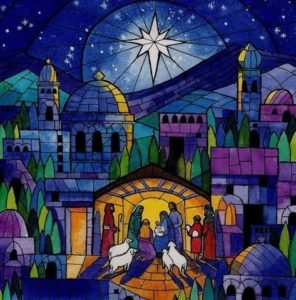 Fiction or non-fiction? Truth or lie? Historical fact or just a myth?Here we are at Christmas time where much of the community, church folk and non-church folk alike, will celebrate the birth of Jesus. And more importantly, we celebrate "the incarnation of God," which is just a fancy way of saying "God became flesh."In recent years I have heard numerous discussions around the historical accuracy of the Bible including the Christmas story. The discussions often revolve around the events which we might consider supernatural."Was Mary really a virgin when she conceived Jesus?" "Did an angel really appear to the shepherds to tell them of Jesus' birth?" "Was Jesus really both a person and God, both human and divine?"Historical fact or just a myth? To the modern mind this question seems pressing. To a society which measures truth by scientific instruments this question begs for a straight answer. We want to know, "Is it fiction or non-fiction, truth or lie, historical fact or just a myth?"Those who can't swallow that the events surrounding Jesus' birth are historically accurate sometimes say, "Oh, the whole Christmas story is just a myth." This is a statement to which I must agree. However, I would say, "It is not JUST a myth. Rather, it is NO LESS than a myth."
Fiction or non-fiction? Truth or lie? Historical fact or just a myth?Here we are at Christmas time where much of the community, church folk and non-church folk alike, will celebrate the birth of Jesus. And more importantly, we celebrate "the incarnation of God," which is just a fancy way of saying "God became flesh."In recent years I have heard numerous discussions around the historical accuracy of the Bible including the Christmas story. The discussions often revolve around the events which we might consider supernatural."Was Mary really a virgin when she conceived Jesus?" "Did an angel really appear to the shepherds to tell them of Jesus' birth?" "Was Jesus really both a person and God, both human and divine?"Historical fact or just a myth? To the modern mind this question seems pressing. To a society which measures truth by scientific instruments this question begs for a straight answer. We want to know, "Is it fiction or non-fiction, truth or lie, historical fact or just a myth?"Those who can't swallow that the events surrounding Jesus' birth are historically accurate sometimes say, "Oh, the whole Christmas story is just a myth." This is a statement to which I must agree. However, I would say, "It is not JUST a myth. Rather, it is NO LESS than a myth."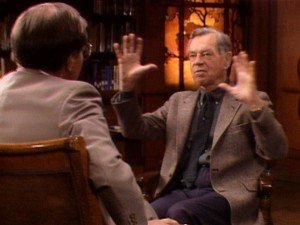 Myths are one of those powerful and profound realities that help shape and give meaning to the experiences of life. Much of the Bible is myth. Which means that it may not be true in an historical or scientific sense. But its truth lies in deeper places, more sacred than instruments can touch.Joseph Campbell, considered the world's leading mythologist, says this: "Mythology is not a lie, mythology is poetry, it is metaphorical. It has been well said that mythology is the penultimate truth--penultimate because the ultimate cannot be put into words. It is beyond words, beyond images...Mythology pitches the mind...to what can be known but not told. So this is the penultimate truth." (The Power of Myth, 1988)In other words, myths point us to the ultimate truth--a truth which lies beyond any story or historical event. We don't believe the Christmas story is true because someone found evidence that Mary really was a virgin, or because it was proven that God really did descend and become human in Jesus. We believe the Christmas story is true because it points to the ultimate truth--a truth we feel and know, but can only express through mythic stories.
Myths are one of those powerful and profound realities that help shape and give meaning to the experiences of life. Much of the Bible is myth. Which means that it may not be true in an historical or scientific sense. But its truth lies in deeper places, more sacred than instruments can touch.Joseph Campbell, considered the world's leading mythologist, says this: "Mythology is not a lie, mythology is poetry, it is metaphorical. It has been well said that mythology is the penultimate truth--penultimate because the ultimate cannot be put into words. It is beyond words, beyond images...Mythology pitches the mind...to what can be known but not told. So this is the penultimate truth." (The Power of Myth, 1988)In other words, myths point us to the ultimate truth--a truth which lies beyond any story or historical event. We don't believe the Christmas story is true because someone found evidence that Mary really was a virgin, or because it was proven that God really did descend and become human in Jesus. We believe the Christmas story is true because it points to the ultimate truth--a truth we feel and know, but can only express through mythic stories.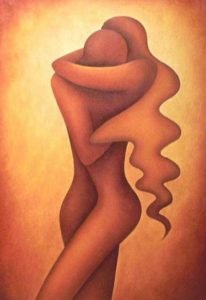 We believe the Christmas myth because it unveils the beautiful dance between the human and her partner, the divine, in each of our lives. We believe the Christmas myth because it reveals the spiritual nature of all births and new beginnings. We believe the Christmas myth because it teaches us about the nature of our lives. It teaches us that God and flesh are not separate and, in fact, are tightly intertwined in such a way that we are "fully human, fully divine."It doesn't matter whether the events surrounding Jesus' birth happened exactly as they are portrayed. All that matters is whether you feel more alive and compassionate when you read it. All that matters is whether it puts you in touch with the human/divine dance playing within you. If it does that then this myth holds more truth than any historical event will ever hold.The Christmas story is not JUST a myth. It is NO LESS than a myth.
We believe the Christmas myth because it unveils the beautiful dance between the human and her partner, the divine, in each of our lives. We believe the Christmas myth because it reveals the spiritual nature of all births and new beginnings. We believe the Christmas myth because it teaches us about the nature of our lives. It teaches us that God and flesh are not separate and, in fact, are tightly intertwined in such a way that we are "fully human, fully divine."It doesn't matter whether the events surrounding Jesus' birth happened exactly as they are portrayed. All that matters is whether you feel more alive and compassionate when you read it. All that matters is whether it puts you in touch with the human/divine dance playing within you. If it does that then this myth holds more truth than any historical event will ever hold.The Christmas story is not JUST a myth. It is NO LESS than a myth.
I Was Once a Stranger...
Mystic Mondays December 12, 2016Dear Readers,The following post is an edited version of a blog post that I written while on my Rome to Rumi pilgrimage in the fall of 2014 just as the political environment was becoming fragile and dangerous in Turkey. Because of recent events regarding the treatment of American Muslims and an intention to dive into my From Rome to Rumi book I have decided to reprint this edited version.Here it is:I woke up in Kesan for my first full day in Turkey after cycling 1,500 miles through Italy and Greece. While eating breakfast the news on the screen above me didn’t look good. German shepherds, tear gas, armored tanks and vandalized storefronts and vehicles filled the screen. I had pedaled my way right into a political crisis. ISIS was attacking the Kurds just over the southern border. The Turkish government was slow to respond and the Turkish people were letting their displeasure be known.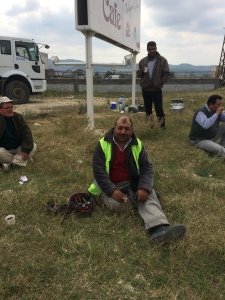 I was in a foreign land. Didn’t speak a word of Turkish and had no idea of how Turkish Muslims would react to an American clad in funny spandex clothing riding through their country at the height of political unrest. I was soon to find out. I hadn’t traveled more than fifteen kilometers when a man with a bald head started gesturing my way with a large loaf of bread. He was inviting me to join him and his road crew for lunch.I wasn’t hungry, but I wasn’t going to pass up this opportunity nor take the risk of offending my new Turkish hosts. I was given a large tray filled with lentil soup, rice, some sort of meatballs and a half loaf of bread. I picked away at the items eating the most easily digestible items first. I didn’t want to stuff myself and find myself vomiting down the road later.Next came an awkward dance. I couldn’t finish my meal, but it was also clear that I hadn’t eaten enough to satisfy some unspoken rule that I could feel in the air. The man to the left of me clearly expected me to eat everything that was put in front of me. The man to the right, who had first waved me over, was trying to guide me through the meal. Finally the message became clear—I could leave everything on my tray except for the meatballs. Those could not be wasted.As soon as I finished the last meatball the man to the right snatched up my tray and shoveled the rest of the food off into the grass. Then he pointed to a herd of goats nearby and gestured between them and his mouth. They had killed a goat for this meal. Cultural and religious protocol demanded that all of it be eaten. The sacrifice of an animal was to not be treated lightly.
I was in a foreign land. Didn’t speak a word of Turkish and had no idea of how Turkish Muslims would react to an American clad in funny spandex clothing riding through their country at the height of political unrest. I was soon to find out. I hadn’t traveled more than fifteen kilometers when a man with a bald head started gesturing my way with a large loaf of bread. He was inviting me to join him and his road crew for lunch.I wasn’t hungry, but I wasn’t going to pass up this opportunity nor take the risk of offending my new Turkish hosts. I was given a large tray filled with lentil soup, rice, some sort of meatballs and a half loaf of bread. I picked away at the items eating the most easily digestible items first. I didn’t want to stuff myself and find myself vomiting down the road later.Next came an awkward dance. I couldn’t finish my meal, but it was also clear that I hadn’t eaten enough to satisfy some unspoken rule that I could feel in the air. The man to the left of me clearly expected me to eat everything that was put in front of me. The man to the right, who had first waved me over, was trying to guide me through the meal. Finally the message became clear—I could leave everything on my tray except for the meatballs. Those could not be wasted.As soon as I finished the last meatball the man to the right snatched up my tray and shoveled the rest of the food off into the grass. Then he pointed to a herd of goats nearby and gestured between them and his mouth. They had killed a goat for this meal. Cultural and religious protocol demanded that all of it be eaten. The sacrifice of an animal was to not be treated lightly.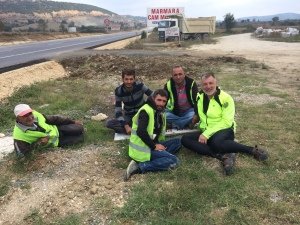 Only later did I discover that what I had been invited into was a celebration of Eid al Adha, “The Festival of Sacrifice” one of two high holy days on the Muslim calendar. One aspect of the celebration is that one-third of the sacrificed goat must go to the stranger, the pilgrim, and the needy. I just happened to come by at the right moment and I was the stranger who took my place in the unfolding drama of this holy celebration. When we parted we shared a deep embrace and the double kiss that is custom in the East. I was a welcome guest in this foreign country.I share this today because in recent weeks we have heard that mosques are being threatened with violence and American Muslims are being targeted for harassment and even hate crimes. It is hard to imagine the Muslim brothers I met that day deserving such treatment and vitriol. They were just the opposite of the stereotypes we have concocted.What I experienced that first day in riding into Turkey became the pattern for the next three weeks as I cycled into the heart of Turkey. I was repeatedly invited to share tea with shop owners and random people I had met. I was welcomed into mosques to pray without any hesitation or wariness on their part.“Welcoming the stranger” is a way of life for the vast majority of Muslims. It’s a cultural expectation and a religious responsibility. I will forever remember my three weeks of being welcomed by Muslim brothers and sisters in Turkey in the middle of a political crisis.Now it’s our turn. Let’s return the favor.
Only later did I discover that what I had been invited into was a celebration of Eid al Adha, “The Festival of Sacrifice” one of two high holy days on the Muslim calendar. One aspect of the celebration is that one-third of the sacrificed goat must go to the stranger, the pilgrim, and the needy. I just happened to come by at the right moment and I was the stranger who took my place in the unfolding drama of this holy celebration. When we parted we shared a deep embrace and the double kiss that is custom in the East. I was a welcome guest in this foreign country.I share this today because in recent weeks we have heard that mosques are being threatened with violence and American Muslims are being targeted for harassment and even hate crimes. It is hard to imagine the Muslim brothers I met that day deserving such treatment and vitriol. They were just the opposite of the stereotypes we have concocted.What I experienced that first day in riding into Turkey became the pattern for the next three weeks as I cycled into the heart of Turkey. I was repeatedly invited to share tea with shop owners and random people I had met. I was welcomed into mosques to pray without any hesitation or wariness on their part.“Welcoming the stranger” is a way of life for the vast majority of Muslims. It’s a cultural expectation and a religious responsibility. I will forever remember my three weeks of being welcomed by Muslim brothers and sisters in Turkey in the middle of a political crisis.Now it’s our turn. Let’s return the favor.
Thanks Diana Butler Bass
Mystic Mondays December 5, 2016
"I feel like I am trying to find my voice again."
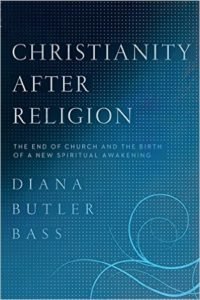 Those were the words (or something close) of Diana Butler Bass last week on a Facebook post. Butler Bass is the author of at least ten books on culture and religion and a person who is considered to have a finger on the pulse of the American religious landscape. I had been feeling those same words in recent months and especially acutely since waking up on November 9. I had wondered what was going on with me. I breathed a sigh of relief when the great Diana Butler Bass was also feeling a bit lost.This has really rattled me. I have spent recent years following a call to find a new way to be a religious voice in the community. It is my chosen profession and my deepest passion. I have two religious degrees and two decades of experience serving as a pastor of Protestant churches. Yet in recent years the pulpit has slowly transformed from the moral centerpiece of the community to the exclusive property of church members.In many ways my pilgrimages and blogging have been my way of building a new pulpit that speaks not only to the faithful within church walls, but to a whole community seeking spiritual reflection and growth. I thought I knew what I was doing. I was exploring the modern return of ancient religious mysticism. I was speaking the language of the "spiritual but not religious." I was carving out a new voice for myself in this changing religious and cultural landscape.And then November 9 happened. Trump crashed a party I didn't even know we were having. A political and spiritual earthquake shook us to the core.And now I feel lost. What the hell does mysticism have to do with our new reality? Do terms like "spiritual but not religious" have any meaning in this new world? Will it really matter? Is the only thing that matters now whether one is for Trump or against?
Those were the words (or something close) of Diana Butler Bass last week on a Facebook post. Butler Bass is the author of at least ten books on culture and religion and a person who is considered to have a finger on the pulse of the American religious landscape. I had been feeling those same words in recent months and especially acutely since waking up on November 9. I had wondered what was going on with me. I breathed a sigh of relief when the great Diana Butler Bass was also feeling a bit lost.This has really rattled me. I have spent recent years following a call to find a new way to be a religious voice in the community. It is my chosen profession and my deepest passion. I have two religious degrees and two decades of experience serving as a pastor of Protestant churches. Yet in recent years the pulpit has slowly transformed from the moral centerpiece of the community to the exclusive property of church members.In many ways my pilgrimages and blogging have been my way of building a new pulpit that speaks not only to the faithful within church walls, but to a whole community seeking spiritual reflection and growth. I thought I knew what I was doing. I was exploring the modern return of ancient religious mysticism. I was speaking the language of the "spiritual but not religious." I was carving out a new voice for myself in this changing religious and cultural landscape.And then November 9 happened. Trump crashed a party I didn't even know we were having. A political and spiritual earthquake shook us to the core.And now I feel lost. What the hell does mysticism have to do with our new reality? Do terms like "spiritual but not religious" have any meaning in this new world? Will it really matter? Is the only thing that matters now whether one is for Trump or against?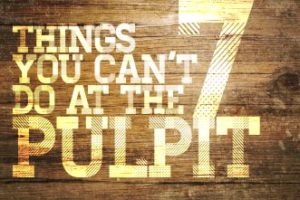 And what about that church pulpit that has felt more and more pushed to the sidelines of American politics and culture in recent decades? Will pulpits be defined by how closely they cozy up to Trump or how often they criticize Trump through veiled references? Will churches find themselves even further down the path of irrelevancy as they preach a soft neutrality and half-truths? Or will preachers once again claim that once sacred and honored tradition to be the moral voice for the community holding our leaders to a higher standard of ethical and spiritual character? Will we preach the gospel with no concern for who it offends or doesn't offend only seeking to please God Herself."I feel like I am trying to find my voice again," writes Diana Butler Bass. If she, who has had one of the clearest and most distinctive voices in our culture, is questioning her voice I wonder how much we all are questioning our voices, our choices and our priorities. She is rattled. I am rattled. I wonder if you all are rattled too. Here are the questions I am now asking:"Can I continue to write under a title 'Mystic Mondays' and feel that it has any relevance to our time?""What is my voice now? Is to renew that prophetic role from the pulpit that first drew me to preaching? Is it to take my blogging and speaking a whole new direction?""Are there things more important than work and financial security?""What are the risks of doing something? What are the risks of not doing something?""Shall I retreat from political responsibility into bike riding, guitar playing and family and friends and hope all this just passes?""Shall I buckle down for the long haul and commit to fighting a war that feels imminent?"
And what about that church pulpit that has felt more and more pushed to the sidelines of American politics and culture in recent decades? Will pulpits be defined by how closely they cozy up to Trump or how often they criticize Trump through veiled references? Will churches find themselves even further down the path of irrelevancy as they preach a soft neutrality and half-truths? Or will preachers once again claim that once sacred and honored tradition to be the moral voice for the community holding our leaders to a higher standard of ethical and spiritual character? Will we preach the gospel with no concern for who it offends or doesn't offend only seeking to please God Herself."I feel like I am trying to find my voice again," writes Diana Butler Bass. If she, who has had one of the clearest and most distinctive voices in our culture, is questioning her voice I wonder how much we all are questioning our voices, our choices and our priorities. She is rattled. I am rattled. I wonder if you all are rattled too. Here are the questions I am now asking:"Can I continue to write under a title 'Mystic Mondays' and feel that it has any relevance to our time?""What is my voice now? Is to renew that prophetic role from the pulpit that first drew me to preaching? Is it to take my blogging and speaking a whole new direction?""Are there things more important than work and financial security?""What are the risks of doing something? What are the risks of not doing something?""Shall I retreat from political responsibility into bike riding, guitar playing and family and friends and hope all this just passes?""Shall I buckle down for the long haul and commit to fighting a war that feels imminent?" A month ago the world changed. How much, I just don't know yet. What I do know is that the things that have helped me keep my bearings have either been shattered or shaken up. I don't know which way is up any longer. I vacillate back and forth between an engaged anger at one moment to a crumpled mass of nervous, useless flesh at other moments. What felt real a month ago has vanished like steam. A world that made sense a few weeks ago now seems more like a jostled Scrabble board.Here's what I promise you, however. I will keep writing. I will keep sharing my confusion. I will feel and experiment and write my way through this. If I am angry that's what you'll get. If I am in a fighting mood that's what you'll read about. If I happen to see some deeper mystical purpose in all of this I promise not to keep it to myself. I will tell if I am feeling despondent just as easily as if I am feeling tenacious. And hopefully, word by word, feeling by feeling, day by day, it will all make sense again.The truth is I never really lost my voice. This is my voice. It won't always be pretty. But you can be damn sure that it will be honest.Thanks, Diana, for being honest too.
A month ago the world changed. How much, I just don't know yet. What I do know is that the things that have helped me keep my bearings have either been shattered or shaken up. I don't know which way is up any longer. I vacillate back and forth between an engaged anger at one moment to a crumpled mass of nervous, useless flesh at other moments. What felt real a month ago has vanished like steam. A world that made sense a few weeks ago now seems more like a jostled Scrabble board.Here's what I promise you, however. I will keep writing. I will keep sharing my confusion. I will feel and experiment and write my way through this. If I am angry that's what you'll get. If I am in a fighting mood that's what you'll read about. If I happen to see some deeper mystical purpose in all of this I promise not to keep it to myself. I will tell if I am feeling despondent just as easily as if I am feeling tenacious. And hopefully, word by word, feeling by feeling, day by day, it will all make sense again.The truth is I never really lost my voice. This is my voice. It won't always be pretty. But you can be damn sure that it will be honest.Thanks, Diana, for being honest too.
An Outdoor Spirituality
Mystic Mondays November 28, 2016 (Post-Thanksgiving Lazy Edition)About two years I added into my daily time of morning meditation (and strong cup of coffee) a practice of reading just a page or two of some writer who transports me to a more reflective place. Currently I am about halfway through the late Irish poet and theologian, John O' Donohue's, Eternal Echoes: Exploring Our Yearning to Belong.Many lines of his give me something to ponder each day, but a line yesterday really tweaked my interest. Writing on the topic of Celtic spirituality he says,
It is interesting to reflect that the Celts were not taken with the construction of great architecture. They loved the vitality and magic of open spaces. Celtic spirituality is an outdoor spirituality.
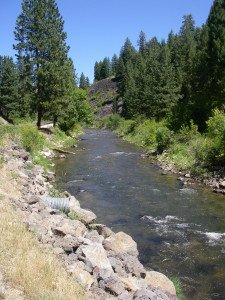 I live in the great Pacific Northwest known for its stunning physical beauty, relatively mild seasons (anything is mild compared to Wisconsin!), and year round recreational opportunities. People here love to hike, bike, kayak, bird watch, camp, ski, snowshoe, garden, dig for clams, drink coffee at open air cafes, and even walk in the rain! Nature is...well...second nature to Oregonians.Oregon is also known for having one of the highest percentages of religiously unaffiliated in the entire country. I don't think this is a coincidence. If you had the choice of hiking to a waterfall or sitting in a pew listening even to a well-delivered sermon chances are most Oregonians would choose the trek to the waterfall.I have only been in Oregon for fourteen years, but I know that I fit the typical Pacific Northwest stereotype. When I can get away on the weekend you will find me cycling, hiking or snowshoeing, depending on the season. I resonate with O' Donohue and his understanding of Celtic spirituality being an outdoor spirituality. My adventures out on the trails or on the roads don't feel like just the required exercise that the doctor ordered. I immerse myself in the sensual experience of nature to restore my soul, remind myself of the earth's rhythms and distance myself from the abusive noises that come from city life.
I live in the great Pacific Northwest known for its stunning physical beauty, relatively mild seasons (anything is mild compared to Wisconsin!), and year round recreational opportunities. People here love to hike, bike, kayak, bird watch, camp, ski, snowshoe, garden, dig for clams, drink coffee at open air cafes, and even walk in the rain! Nature is...well...second nature to Oregonians.Oregon is also known for having one of the highest percentages of religiously unaffiliated in the entire country. I don't think this is a coincidence. If you had the choice of hiking to a waterfall or sitting in a pew listening even to a well-delivered sermon chances are most Oregonians would choose the trek to the waterfall.I have only been in Oregon for fourteen years, but I know that I fit the typical Pacific Northwest stereotype. When I can get away on the weekend you will find me cycling, hiking or snowshoeing, depending on the season. I resonate with O' Donohue and his understanding of Celtic spirituality being an outdoor spirituality. My adventures out on the trails or on the roads don't feel like just the required exercise that the doctor ordered. I immerse myself in the sensual experience of nature to restore my soul, remind myself of the earth's rhythms and distance myself from the abusive noises that come from city life.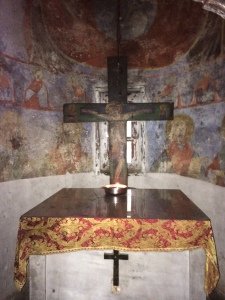 But I am also a pastor who is responsible for nurturing a church spirituality among my congregation and in my community. Despite my sometimes critical voice about the church's increasing irrelevance among moderns (especially in the Northwest) I also relish the spirituality that emerges from gathering around a common table. I hold a real reverence for the place and the power of the pulpit to speak truth in a culture where lies and truth are getting difficult to distinguish. And I cherish the spirituality of compassion that gets lived out between members during the rawest times of life and the most celebrated.The church where I am currently serving as a pastor has started an Earth Adventurers group that now has over 100 loosely committed individuals from Southern Oregon. The thread that holds them together is both broad and simple: Do you experience God or the Sacred in nature and want to join others in activities that honor our connection to and enjoyment of the earth?But I am noticing a familiar pattern. In years past it seemed to me that I had a church spirituality and an outdoor (or Celtic) spirituality, but that the two didn't mix well. On Saturdays I practiced my outdoor spirituality and then rushed home in time to write a sermon so that on Sunday I was ready to lead my congregation in their church spirituality.
But I am also a pastor who is responsible for nurturing a church spirituality among my congregation and in my community. Despite my sometimes critical voice about the church's increasing irrelevance among moderns (especially in the Northwest) I also relish the spirituality that emerges from gathering around a common table. I hold a real reverence for the place and the power of the pulpit to speak truth in a culture where lies and truth are getting difficult to distinguish. And I cherish the spirituality of compassion that gets lived out between members during the rawest times of life and the most celebrated.The church where I am currently serving as a pastor has started an Earth Adventurers group that now has over 100 loosely committed individuals from Southern Oregon. The thread that holds them together is both broad and simple: Do you experience God or the Sacred in nature and want to join others in activities that honor our connection to and enjoyment of the earth?But I am noticing a familiar pattern. In years past it seemed to me that I had a church spirituality and an outdoor (or Celtic) spirituality, but that the two didn't mix well. On Saturdays I practiced my outdoor spirituality and then rushed home in time to write a sermon so that on Sunday I was ready to lead my congregation in their church spirituality.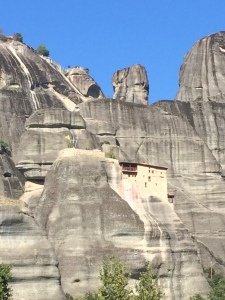 The same is becoming true for the Earth Adventurers and Bethany church. Despite my involvement in both communities I find it challenging to describe the spirituality of the church to the Earth Adventurers and, vice versa, difficult to describe the spirituality of the Earth Adventurers to the church in a way that both groups would go, "Aha. I get it!"I will admit that this post is basically a challenge to both the church faithful and the earth faithful and a cheer to those of you who fit in both camps simultaneously.I have a dream (nothing on par with MLK, mind you!). I have a dream that someday I won't have an outdoor spirituality and a church spirituality. I will just have a spirituality--a spirituality that experiences the Sacred in nature, around a communion table, sitting at the bedside of a sick patient, and preaching from a wooden pulpit.I have a dream that someday Pacific Northwesterners won't have to choose between meeting God on the trail or in the pews on Sundays. I have a dream that one day church won't be defined by walls, but by meeting God on the road of life. I have a dream that the church will start looking for God outside rather than expecting God to take up a seat inside.
The same is becoming true for the Earth Adventurers and Bethany church. Despite my involvement in both communities I find it challenging to describe the spirituality of the church to the Earth Adventurers and, vice versa, difficult to describe the spirituality of the Earth Adventurers to the church in a way that both groups would go, "Aha. I get it!"I will admit that this post is basically a challenge to both the church faithful and the earth faithful and a cheer to those of you who fit in both camps simultaneously.I have a dream (nothing on par with MLK, mind you!). I have a dream that someday I won't have an outdoor spirituality and a church spirituality. I will just have a spirituality--a spirituality that experiences the Sacred in nature, around a communion table, sitting at the bedside of a sick patient, and preaching from a wooden pulpit.I have a dream that someday Pacific Northwesterners won't have to choose between meeting God on the trail or in the pews on Sundays. I have a dream that one day church won't be defined by walls, but by meeting God on the road of life. I have a dream that the church will start looking for God outside rather than expecting God to take up a seat inside.
Thank you, dear Leonard...
Mystic Mondays November 21, 2016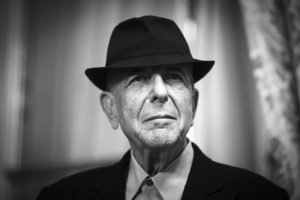 I was late to the party when it came to Leonard Cohen. In fact, I only heard of him for the first time when hearing the Jeff Buckley version of Hallelujah in about 2007. In the next few years I think I bought six CD's of Cohen's music and the DVD version of his "Live in London" performance. At the time I also didn't know that he had spent years in a Buddhist monastery and become a Buddhist monk himself. But I knew that his haunting and playful lyrics had a soulful, spiritual, even religious, quality to them. I swore that I could feel the same Presence underneath his music that I relied on when preaching.Leonard Cohen died on November 7--the day before the election. I don't know if he had an inkling of what was to come and just wanted out, but I do know that a quiet prophetic truth would have poured out of him. Cohen had that ability to name hidden realities that most of us can feel but not quite name. Hallelujah is probably his most popular example:
I was late to the party when it came to Leonard Cohen. In fact, I only heard of him for the first time when hearing the Jeff Buckley version of Hallelujah in about 2007. In the next few years I think I bought six CD's of Cohen's music and the DVD version of his "Live in London" performance. At the time I also didn't know that he had spent years in a Buddhist monastery and become a Buddhist monk himself. But I knew that his haunting and playful lyrics had a soulful, spiritual, even religious, quality to them. I swore that I could feel the same Presence underneath his music that I relied on when preaching.Leonard Cohen died on November 7--the day before the election. I don't know if he had an inkling of what was to come and just wanted out, but I do know that a quiet prophetic truth would have poured out of him. Cohen had that ability to name hidden realities that most of us can feel but not quite name. Hallelujah is probably his most popular example:
I've seen your flag on the marble arch,But love is not a victory march,It's a cold and it's a broken hallelujah.
"Broken hallelujah." Was there ever a more perfect description of the complex nature of life? Beauty and brokenness. Heaven and hell. Creation and Fall.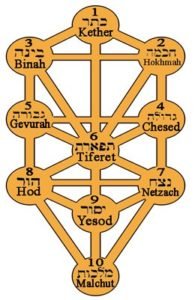 I listened to the last interview he gave this fall in the final weeks of his life. David Remnick of The New Yorker conducted the interview while Cohen was in great pain and in his usual reflective, self-effacing form. I wasn't surprised when Remnick told Cohen that many of his songs sounded like prayers and wondered whether Cohen had intended any religious meaning. Cohen quickly dismissed the idea, but then added that subconsciously themes from his Jewish tradition couldn't help but to seep into his writing. Then he said this about the mystic tradition (Kabbalism) of Judaism:
I listened to the last interview he gave this fall in the final weeks of his life. David Remnick of The New Yorker conducted the interview while Cohen was in great pain and in his usual reflective, self-effacing form. I wasn't surprised when Remnick told Cohen that many of his songs sounded like prayers and wondered whether Cohen had intended any religious meaning. Cohen quickly dismissed the idea, but then added that subconsciously themes from his Jewish tradition couldn't help but to seep into his writing. Then he said this about the mystic tradition (Kabbalism) of Judaism:
One of the great themes of Kabbalistic thought is the repair of God. God, in creation the world, dispersed itself. The Creation is a catastrophe. There are pieces of him or her or it that are everywhere, in fact. The specific task of the Jew is to repair the face of God. The prayers are to remind God that it was once a harmonious unity.
Wow!Does that turn your theology on its head or what? In much of Christianity God is perfect, the world is a catastrophe, and God takes the responsibility to heal the world. In Kabbalistic Judaism it is God who is broken and we who have the responsibility to put God back together again like Humpty Dumpty who had a great fall! I am thinking about this in light of this election and the feeling among many of us that a great earthquake has shook us and torn the moorings from our cultural, political and spiritual boats. We are all trying to make sense of this and come to terms with it in our own ways. I have heard from some who have fallen back on their faith and reminded us that "God is in control." We may be in for a real mess, but we can always depend on the God of the heavens to ultimately take care of things in His own time and in His own way.I do understand this faith. When life becomes more complex than our little brains can handle there is a threshold where we give up trying to have answers. There is a place of trust where we let go and say, "God's got this one because I sure can't figure it out."But as you know I have been inching my way closer and closer to the mystical arms of our religious traditions. It started with experiences for which I had no words. It then led me on a pilgrimage of discovery of Rumi, the late Persian poet in the Islamic Sufi mystic tradition. And recently I have discovered the long lost Christian mystics of the Orthodox faith.
I am thinking about this in light of this election and the feeling among many of us that a great earthquake has shook us and torn the moorings from our cultural, political and spiritual boats. We are all trying to make sense of this and come to terms with it in our own ways. I have heard from some who have fallen back on their faith and reminded us that "God is in control." We may be in for a real mess, but we can always depend on the God of the heavens to ultimately take care of things in His own time and in His own way.I do understand this faith. When life becomes more complex than our little brains can handle there is a threshold where we give up trying to have answers. There is a place of trust where we let go and say, "God's got this one because I sure can't figure it out."But as you know I have been inching my way closer and closer to the mystical arms of our religious traditions. It started with experiences for which I had no words. It then led me on a pilgrimage of discovery of Rumi, the late Persian poet in the Islamic Sufi mystic tradition. And recently I have discovered the long lost Christian mystics of the Orthodox faith.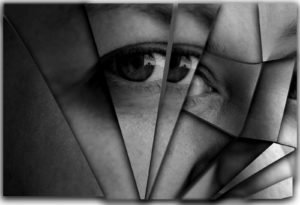 And now this! Cohen is introducing me to Jewish mysticism and I find there is something deeply attractive about this image that this chaotic, broken world that we inhabit is not somehow set off from God but may actually be the shattered face of God. We may be walking on God's broken heart. The wounds of the world may actually be the wounded soul of God's own self.Of course, whether we prefer the God in the Sky of traditional Christianity or the broken God of Jewish mysticism we recognize that they are just images. But something happens when I think of the brokenness of God. Rather than feeling guilt for the mess we have made (the doctrine of the Fall) I feel a deep sense of compassion FOR God. I feel a responsibility to God. If God's heart is broken I cannot but help to want to heal God's eternal wound. And if God's face is shattered into a million pieces I cannot but help to want to pick up the pieces and start putting Humpty Dumpty back together again.What if God isn't actually in control? What if God needs us more than ever? What if we hold the trump card?Thank you, dear Leonard for living your life as a prayer.
And now this! Cohen is introducing me to Jewish mysticism and I find there is something deeply attractive about this image that this chaotic, broken world that we inhabit is not somehow set off from God but may actually be the shattered face of God. We may be walking on God's broken heart. The wounds of the world may actually be the wounded soul of God's own self.Of course, whether we prefer the God in the Sky of traditional Christianity or the broken God of Jewish mysticism we recognize that they are just images. But something happens when I think of the brokenness of God. Rather than feeling guilt for the mess we have made (the doctrine of the Fall) I feel a deep sense of compassion FOR God. I feel a responsibility to God. If God's heart is broken I cannot but help to want to heal God's eternal wound. And if God's face is shattered into a million pieces I cannot but help to want to pick up the pieces and start putting Humpty Dumpty back together again.What if God isn't actually in control? What if God needs us more than ever? What if we hold the trump card?Thank you, dear Leonard for living your life as a prayer.
Life After the Earthquake...
Mystic Mondays November 14, 2016On Wednesday I had a counseling appointment and spent half of the $150/hour time in an uncontrollable bawl-fest that I think left both me and my counselor exhausted. I knew it had to do with the election, but I could not put words to it at first. As we dug down to the mother lode we struck emotional gold. My gut-wrenching episode had to do with the enormous sense of responsibility I felt to my congregation.I was mad at God for putting me in this position.I knew that many would be licking their wounds and wondering what train had run over them. I also knew that just as many were quietly celebrating that America had finally heard them. Our congregation is a microcosm of American society--passionate citizens on both sides of the Republican/Democrat divide.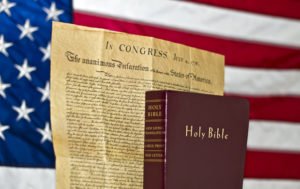 It was tough getting there, but by Saturday I knew that I had to address the election from the pulpit. I knew that some would be concerned (given my equally passionate and vocal opposition to Donald Trump's campaign in my blog) that I might use the pulpit to criticize our president elect. I also knew that others were feeling paralyzed by their inability to reconcile their commitment to their Christian faith and their patriotic duty to support the the president elect.I needed to say something about how the church would respond and how I would use my pulpit in the coming months and years. I needed to find a way to set the tone so that we could move through this time with some semblance of grace. Here is the letter I read to the congregation yesterday morning. I hope you find it helpful as you also consider the delicate line between faith and politics.Dear Bethany Friends,It certainly would be the understatement of the year to acknowledge that much of America feels like a political, spiritual and cultural earthquake hit us this election. Facebook has lit up with a combination of anger and grief on one side and relief and great hope on the other side. It is too early to tell just how long the aftershocks of this earthquake will reverberate through our communities and nation.As I prepared for today I felt a deep sense of responsibility. If I say nothing about what just happened I feel that I would not be living up to my pastoral duty to offer something hopeful from the gospel to an issue that has rocked us to the very core. On the other hand if I step into this political fray I run the risk of alienating some in the congregation and further dividing us just when we are working hard to come together.What I want to assure you today is that the events of this past week are not going to change who I am, what I preach and the gospel that I have staked my life on. I have no interest in either personally challenging the president-elect or in endorsing him from the pulpit.Having said that, however, there are already signs across our country that one outcome of this election is that some Americans are feeling threatened and other Americans are now feeling permission to personally attack fellow citizens. Women and girls are being grabbed and told, “If our president can do it, I can do it.” African-Americans are being harassed and freely called the “N” word. Muslim women are having their head scarves and hajibs torn from their bodies. And protesters are vandalizing businesses, vehicles and public property. This is more than just a political issue. This is a spiritual and moral issue.If I say nothing in this time I will forever carry on my conscience that I stood by and asked Bethany to stand by silently while we Americans tear each other apart. What I want to assure you is that nothing has changed for me. I will continue to preach the gospel of Jesus Christ, a gospel that calls us to “Love our neighbor as ourselves.” I will continue to hold up the life and ministry of Jesus Christ, a life that tore down the “dividing walls of hostility.” I will continue to preach that there is no longer Jew or Greek, slave or free, male and female, for we are all one in Jesus Christ.” I will continue to dream of a time when the Kingdom of God is realized where we lift each other up rather than tear each other down.I also will continue to preach that humiliating others, calling people names, stroking the fires of fear, and making racist, sexist, and misogynistic comments is a direct affront to the gospel of Jesus Christ. My intention is neither to endorse nor to oppose a particular political person from the pulpit. My intention is simply to raise up the gospel of Jesus Christ and hold all Americans to the same standard—Republican and Democrat, the taxicab driver, the elementary school teacher, the local police officer, and, yes, even the President of the United States. If we call ourselves Christian then character matters!As long as I am in this pulpit I will not remain silent while we Americans are attacking, humiliating, demonizing or threatening each other with harm. I am responsible to preach the gospel. Our leaders are responsible for our democracy. I will try to live up to standards of Jesus Christ and pray that our leaders will live up to the standards of the American way.My friends, I want to assure you that this election has not changed the words that will come from this pulpit. I am a preacher of the gospel of Jesus Christ. I can do no other. You should expect nothing less.May God guide us and give us courage as we move through this time together. Amen.
It was tough getting there, but by Saturday I knew that I had to address the election from the pulpit. I knew that some would be concerned (given my equally passionate and vocal opposition to Donald Trump's campaign in my blog) that I might use the pulpit to criticize our president elect. I also knew that others were feeling paralyzed by their inability to reconcile their commitment to their Christian faith and their patriotic duty to support the the president elect.I needed to say something about how the church would respond and how I would use my pulpit in the coming months and years. I needed to find a way to set the tone so that we could move through this time with some semblance of grace. Here is the letter I read to the congregation yesterday morning. I hope you find it helpful as you also consider the delicate line between faith and politics.Dear Bethany Friends,It certainly would be the understatement of the year to acknowledge that much of America feels like a political, spiritual and cultural earthquake hit us this election. Facebook has lit up with a combination of anger and grief on one side and relief and great hope on the other side. It is too early to tell just how long the aftershocks of this earthquake will reverberate through our communities and nation.As I prepared for today I felt a deep sense of responsibility. If I say nothing about what just happened I feel that I would not be living up to my pastoral duty to offer something hopeful from the gospel to an issue that has rocked us to the very core. On the other hand if I step into this political fray I run the risk of alienating some in the congregation and further dividing us just when we are working hard to come together.What I want to assure you today is that the events of this past week are not going to change who I am, what I preach and the gospel that I have staked my life on. I have no interest in either personally challenging the president-elect or in endorsing him from the pulpit.Having said that, however, there are already signs across our country that one outcome of this election is that some Americans are feeling threatened and other Americans are now feeling permission to personally attack fellow citizens. Women and girls are being grabbed and told, “If our president can do it, I can do it.” African-Americans are being harassed and freely called the “N” word. Muslim women are having their head scarves and hajibs torn from their bodies. And protesters are vandalizing businesses, vehicles and public property. This is more than just a political issue. This is a spiritual and moral issue.If I say nothing in this time I will forever carry on my conscience that I stood by and asked Bethany to stand by silently while we Americans tear each other apart. What I want to assure you is that nothing has changed for me. I will continue to preach the gospel of Jesus Christ, a gospel that calls us to “Love our neighbor as ourselves.” I will continue to hold up the life and ministry of Jesus Christ, a life that tore down the “dividing walls of hostility.” I will continue to preach that there is no longer Jew or Greek, slave or free, male and female, for we are all one in Jesus Christ.” I will continue to dream of a time when the Kingdom of God is realized where we lift each other up rather than tear each other down.I also will continue to preach that humiliating others, calling people names, stroking the fires of fear, and making racist, sexist, and misogynistic comments is a direct affront to the gospel of Jesus Christ. My intention is neither to endorse nor to oppose a particular political person from the pulpit. My intention is simply to raise up the gospel of Jesus Christ and hold all Americans to the same standard—Republican and Democrat, the taxicab driver, the elementary school teacher, the local police officer, and, yes, even the President of the United States. If we call ourselves Christian then character matters!As long as I am in this pulpit I will not remain silent while we Americans are attacking, humiliating, demonizing or threatening each other with harm. I am responsible to preach the gospel. Our leaders are responsible for our democracy. I will try to live up to standards of Jesus Christ and pray that our leaders will live up to the standards of the American way.My friends, I want to assure you that this election has not changed the words that will come from this pulpit. I am a preacher of the gospel of Jesus Christ. I can do no other. You should expect nothing less.May God guide us and give us courage as we move through this time together. Amen.
Outer and Inner...
Mystic Mondays November 7, 2016
"They (psychology, philosophy and religion) concern themselves with the outer meaning of the world, the inner meaning of the soul, and the threshold where the two meet." John O' Donohue in Eternal Echoes
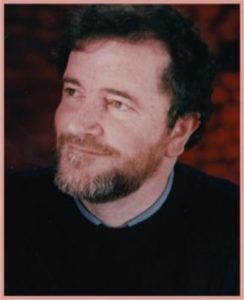 I read that line yesterday morning in the middle of my daily practice of meditation and opening myself to some stream-of-consciousness journaling. I immediately sat straight up as I recognized it. It mirrored both in intention and in words the tagline that I use at the bottom of my PedalPilgrim emails and on my website: Exploring the World, Discovering the Soul.I remember when my business coach and I came up with this line after weeks of brainstorming, trying on words, and exploring the chords they struck. We had circled around it a number of times as I found myself repeating over and over that this work, this call, this inner prodding that I feel has something to do with "going out and coming back" and finding the right balance between the two. Too much emphasis on one or the other left me feeling uneasy. As much as I love adventures it wasn't satisfying to just flit from one adventure to another like a travel writer. On the other hand, a life of just responding to the often narrow parochial concerns of church life left me feeling claustrophobic.It wasn't either life on the road that I wanted or life in the local parish. It was something about living on the bridge between the two, something about the threshold between the outer world and the inner world that seems to be driving this restless passionate pursuit that I have.
I read that line yesterday morning in the middle of my daily practice of meditation and opening myself to some stream-of-consciousness journaling. I immediately sat straight up as I recognized it. It mirrored both in intention and in words the tagline that I use at the bottom of my PedalPilgrim emails and on my website: Exploring the World, Discovering the Soul.I remember when my business coach and I came up with this line after weeks of brainstorming, trying on words, and exploring the chords they struck. We had circled around it a number of times as I found myself repeating over and over that this work, this call, this inner prodding that I feel has something to do with "going out and coming back" and finding the right balance between the two. Too much emphasis on one or the other left me feeling uneasy. As much as I love adventures it wasn't satisfying to just flit from one adventure to another like a travel writer. On the other hand, a life of just responding to the often narrow parochial concerns of church life left me feeling claustrophobic.It wasn't either life on the road that I wanted or life in the local parish. It was something about living on the bridge between the two, something about the threshold between the outer world and the inner world that seems to be driving this restless passionate pursuit that I have.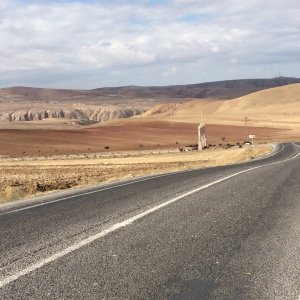 I have come to believe that these callings that nag at us persistently are often rooted in our own personal stories. Our soul has a way of pushing us into landscapes that heal old wounds and invite unresolved issues to rise to the surface.This language of outer and inner is important to me. I grew up in a home that looked pretty normal from the street. To the outside observer we were the typical American family--two parents and two children in a small three-bedroom house in a growing Front Range town in Northern Colorado. But divorce and depression had invaded our home early in my childhood. We kept it well-hidden or so we thought. The picture perfect family of four hid the soullessness and emotional deadness that reigned deep inside of us. Still to this day I can remember the walls, the rooms, and the placement of furniture. But I cannot access any feelings associated with that house except a long drawn-out emotionless existence.What does this have to do with John O'Donohue's quote and my website tagline, you rightly ask? My work and calling have been shaped by this deep distrust of anything that looks pretty on the outside, but lacks a vitality, a spirit, a soulfulness, and life on the inside. Some say that I have developed a pretty sophisticated bullshit detector. I think there is some truth to that. I prefer to think of it not so much as being able to recognize bullshit when it's hidden away, but simply to recognize the deeper truth, the deeper reality, and the unsaid things that we often can feel, but can't put words to.
I have come to believe that these callings that nag at us persistently are often rooted in our own personal stories. Our soul has a way of pushing us into landscapes that heal old wounds and invite unresolved issues to rise to the surface.This language of outer and inner is important to me. I grew up in a home that looked pretty normal from the street. To the outside observer we were the typical American family--two parents and two children in a small three-bedroom house in a growing Front Range town in Northern Colorado. But divorce and depression had invaded our home early in my childhood. We kept it well-hidden or so we thought. The picture perfect family of four hid the soullessness and emotional deadness that reigned deep inside of us. Still to this day I can remember the walls, the rooms, and the placement of furniture. But I cannot access any feelings associated with that house except a long drawn-out emotionless existence.What does this have to do with John O'Donohue's quote and my website tagline, you rightly ask? My work and calling have been shaped by this deep distrust of anything that looks pretty on the outside, but lacks a vitality, a spirit, a soulfulness, and life on the inside. Some say that I have developed a pretty sophisticated bullshit detector. I think there is some truth to that. I prefer to think of it not so much as being able to recognize bullshit when it's hidden away, but simply to recognize the deeper truth, the deeper reality, and the unsaid things that we often can feel, but can't put words to.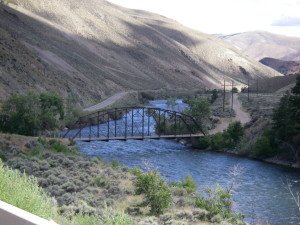 It is no surprise really that I was attracted to the world of religion early in college. Religion connects our outer reality with the deeper, inner realities. Religion ("religio"-- to bind or integrate) is interested in the threshold, the bridge, and the connection between our inner impulses and the outer world that we create.Like many of us in the helping professions my immersion in the world of religion emerged out of my need to heal the great disparity between my inner and outer worlds. But this is not just my issue. We Americans are a very schizophrenic people. We are experts at presenting picture perfect fronts while experiencing spiritual poverty. We trick ourselves into believing that we have it all together while suffering from addictions, deadening our souls with medications, and ignoring symptoms of personal and societal disorders.John O'Donahue says that religion is concerned with the outer meaning of the world and the inner meaning of the soul and the threshold where the two meet. Three years I came up with that tagline to define this nagging call and work that I do. There is something about this threshold between the world and the soul that keeps me on this journey of discovery.I wonder if this threshold between the outer and the inner is where God is found. I wonder if where the world and the soul kiss is where Life is conceived.
It is no surprise really that I was attracted to the world of religion early in college. Religion connects our outer reality with the deeper, inner realities. Religion ("religio"-- to bind or integrate) is interested in the threshold, the bridge, and the connection between our inner impulses and the outer world that we create.Like many of us in the helping professions my immersion in the world of religion emerged out of my need to heal the great disparity between my inner and outer worlds. But this is not just my issue. We Americans are a very schizophrenic people. We are experts at presenting picture perfect fronts while experiencing spiritual poverty. We trick ourselves into believing that we have it all together while suffering from addictions, deadening our souls with medications, and ignoring symptoms of personal and societal disorders.John O'Donahue says that religion is concerned with the outer meaning of the world and the inner meaning of the soul and the threshold where the two meet. Three years I came up with that tagline to define this nagging call and work that I do. There is something about this threshold between the world and the soul that keeps me on this journey of discovery.I wonder if this threshold between the outer and the inner is where God is found. I wonder if where the world and the soul kiss is where Life is conceived.
No Preacher Needed
Mystic Mondays October 31, 2016I think I saw a glimpse of the future yesterday morning.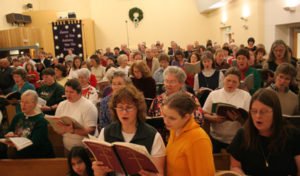 The church where I serve decided to use the 5th Sunday of the month as time to experiment a little. I have served churches before where the 5th Sunday is used as an Old-Fashioned Hymn Sing. It often comes at the request of older members who miss the cherished hymns of their childhood and early childrearing days. I get it! I grew up on the music of John Denver, Dan Fogelberg, Bread, and the Carpenters. I still find myself humming, "Take Me Home, Country Roads" and "Run for the Roses."But Bethany put just enough of a twist in this 5th Sunday Old-Fashioned Hymn Sing to make it feel less like a retreat into memory lane and more like a foretaste of the future. We did sing a handful of oldies and personal favorites, but the worship planners also invited poets and wannabe poets to share on the theme of "Saints Among Us" given that All Saints Day was just two days hence.What seven poets offered yesterday far outshone anything this one pastor could have done from the pulpit. The poems themselves were powerful, touching, vulnerable and clever. But it wasn't just the poems that made the morning worship so special. It was the fact that the authors of the poems, the ones who had the lived experience shared them. We preachers sometimes find just the perfect poem to make a point, but the preacher is at least one step removed from the experience. Reading a poem of someone else's experience is a poor second to hearing the person's actual experience. A preacher can give something for people to think about, but when a person's actual experience is shared it connects us to and with each other.
The church where I serve decided to use the 5th Sunday of the month as time to experiment a little. I have served churches before where the 5th Sunday is used as an Old-Fashioned Hymn Sing. It often comes at the request of older members who miss the cherished hymns of their childhood and early childrearing days. I get it! I grew up on the music of John Denver, Dan Fogelberg, Bread, and the Carpenters. I still find myself humming, "Take Me Home, Country Roads" and "Run for the Roses."But Bethany put just enough of a twist in this 5th Sunday Old-Fashioned Hymn Sing to make it feel less like a retreat into memory lane and more like a foretaste of the future. We did sing a handful of oldies and personal favorites, but the worship planners also invited poets and wannabe poets to share on the theme of "Saints Among Us" given that All Saints Day was just two days hence.What seven poets offered yesterday far outshone anything this one pastor could have done from the pulpit. The poems themselves were powerful, touching, vulnerable and clever. But it wasn't just the poems that made the morning worship so special. It was the fact that the authors of the poems, the ones who had the lived experience shared them. We preachers sometimes find just the perfect poem to make a point, but the preacher is at least one step removed from the experience. Reading a poem of someone else's experience is a poor second to hearing the person's actual experience. A preacher can give something for people to think about, but when a person's actual experience is shared it connects us to and with each other. For this one-Sunday-only event we invited people to share poems about those people who had shaped them, molded them, and made them the people they are today. We witnessed a wonderful display of the power that people play in our lives. One man spoke of the love of his wife of sixty plus years. A woman recalled the way her grandmother cleverly used games to teach her the lessons of life. Another shared how her beloved animals had taught her patience, grace, and a sacred approach to life. I spoke of a history professor who acted more like a mentor to me than a distant, robed-up academic. One man, who admitted that he hadn't always been a "choir boy," spoke of the intimacy he feels with Jesus. Another woman read poems that she had written shortly after people had died. The last poet, a teacher, gave a nod to the two tenured teachers, members of the congregation still, who had nurtured her along as she began her early education career. A liturgist got up shortly after and reflected on how the whole congregation are saints to each other in one way or another.Religious trends' researchers are telling us that the preaching pastor is going through a major metamorphosis. The 3-point lecture from a pulpit is out. In its place are pastors who are storytellers and facilitators of dialogue and conversation. No longer are people satisfied with a preacher who has enough education to talk about God; people want to experience God in the preaching moment. People don't just want to know what to think or believe about God; they want personal access to God.
For this one-Sunday-only event we invited people to share poems about those people who had shaped them, molded them, and made them the people they are today. We witnessed a wonderful display of the power that people play in our lives. One man spoke of the love of his wife of sixty plus years. A woman recalled the way her grandmother cleverly used games to teach her the lessons of life. Another shared how her beloved animals had taught her patience, grace, and a sacred approach to life. I spoke of a history professor who acted more like a mentor to me than a distant, robed-up academic. One man, who admitted that he hadn't always been a "choir boy," spoke of the intimacy he feels with Jesus. Another woman read poems that she had written shortly after people had died. The last poet, a teacher, gave a nod to the two tenured teachers, members of the congregation still, who had nurtured her along as she began her early education career. A liturgist got up shortly after and reflected on how the whole congregation are saints to each other in one way or another.Religious trends' researchers are telling us that the preaching pastor is going through a major metamorphosis. The 3-point lecture from a pulpit is out. In its place are pastors who are storytellers and facilitators of dialogue and conversation. No longer are people satisfied with a preacher who has enough education to talk about God; people want to experience God in the preaching moment. People don't just want to know what to think or believe about God; they want personal access to God. I often tease that a good pastor is one who is constantly working himself or herself out of a job. I still have quite a bit of job security. I doubt the congregation is ready to jump from a four-times-a-year, 5th Sunday, open mic format to suddenly making it a weekly event. But the tears, the cheers and the clapping that accompanied this Sunday tell us something--they didn't miss this preacher's sermon one little bit. In fact, just the opposite happened. The personal vulnerability, the sharing, and the stories coming from the pews raised their congregational self-esteem. I teased toward the end of the service that "I might just have to give up my pulpit more often if this is what we get in its place." I wonder if they caught that I was only have kidding.I am pretty sure I saw the future yesterday. Which means that if I do my job right I'll slowly work myself out of a job. I wonder if there is any way that I can get that to perfectly coincide with my retirement!
I often tease that a good pastor is one who is constantly working himself or herself out of a job. I still have quite a bit of job security. I doubt the congregation is ready to jump from a four-times-a-year, 5th Sunday, open mic format to suddenly making it a weekly event. But the tears, the cheers and the clapping that accompanied this Sunday tell us something--they didn't miss this preacher's sermon one little bit. In fact, just the opposite happened. The personal vulnerability, the sharing, and the stories coming from the pews raised their congregational self-esteem. I teased toward the end of the service that "I might just have to give up my pulpit more often if this is what we get in its place." I wonder if they caught that I was only have kidding.I am pretty sure I saw the future yesterday. Which means that if I do my job right I'll slowly work myself out of a job. I wonder if there is any way that I can get that to perfectly coincide with my retirement!
My Two Scary Friends
Mystic Mondays October 24, 2016
"For the soul, depression is an initiation, a rite of passage."
The above quote is from Thomas Moore’s book Care of the Soul, a book that has transformed how I think about the nature of diseases, especially related to mental health. I want to state right up front that today’s post is not a rejection of the assumptions that feed the mental health profession. In fact, I have been the beneficiary of many high-skilled therapists and clinical psychologists. I am quite sure that more than one therapist has looked at me and said, “Oh good, looks like I’ll have regular work for awhile!” Yet I have also discovered that emotional states that the DSM-V (a therapist’s diagnostic tool and bible) might have called a disorder and an unwelcome visitor have often been more friend than foe for me. Three times over the last twenty years I have been diagnosed with anxiety and depression in addition to the more sweeping diagnosis of adjustment disorder that accompanies life's tricky transitions.In many ways my earlier experiences with depression and anxiety have become gifts in disguise. Like a bad cold coming on I have been able to recognize the subtle signs of depression and anxiety before their full impact leaves me bed-ridden (or just lethargic and emotionally paralyzed). In recent years I have been able to take action before the I-can't-climb-out-of-this-dark-hole place overwhelms me like it has in the past.
Yet I have also discovered that emotional states that the DSM-V (a therapist’s diagnostic tool and bible) might have called a disorder and an unwelcome visitor have often been more friend than foe for me. Three times over the last twenty years I have been diagnosed with anxiety and depression in addition to the more sweeping diagnosis of adjustment disorder that accompanies life's tricky transitions.In many ways my earlier experiences with depression and anxiety have become gifts in disguise. Like a bad cold coming on I have been able to recognize the subtle signs of depression and anxiety before their full impact leaves me bed-ridden (or just lethargic and emotionally paralyzed). In recent years I have been able to take action before the I-can't-climb-out-of-this-dark-hole place overwhelms me like it has in the past.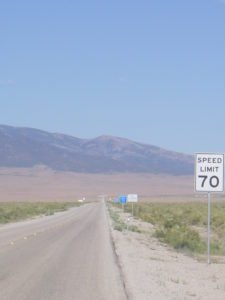 Which tells me something. The depression and anxiety that I have encountered feels less like a disorder and more like a message from my soul that something is not right. Either I am feeling trapped by my circumstances, fearful of my future, or just don't have the right frame of mind to see and feel gratitude for the life that is presently before me. I don't want to dismiss in any way those who have fallen into the pit of despair and depression. I don't want to suggest that just thinking better thoughts is like drinking a magic potion. People who suggest that these "disorders" are just in the mind often multiply the feelings of despair for the person feeling them.But I also want to say that in every case when depression and anxiety has grabbed a hold of me the final answer has always been either a change in my circumstances, a change in my plan, or a shift in my thinking. The depression has never just gone away like a flu bug that has to run its course. The two times I have been on medication I was thankful for the momentary boost, but the lasting solution was always a shift in my life or my perspective. Recovery for me was never "getting over" my anxiety, but was moving through it.Which brings me back to Thomas Moore's quote, "For the soul, depression is an initiation, a rite of passage." I do think there is a place for the diagnosis of clinical depression and I do think that some people seem more genetically predisposed to anxiety and depression than others. But I also think we often treat depression and anxiety as a disorder when we should be treating it as a "shout out" from our soul. I wonder how often depression and anxiety are just signals that our soul is yearning for something that we can't quite put into words yet. Moore makes the case in his book that we in the West often look for cures when what we should be doing is offering more care--thus, the title of his book Care of the Soul.
Which tells me something. The depression and anxiety that I have encountered feels less like a disorder and more like a message from my soul that something is not right. Either I am feeling trapped by my circumstances, fearful of my future, or just don't have the right frame of mind to see and feel gratitude for the life that is presently before me. I don't want to dismiss in any way those who have fallen into the pit of despair and depression. I don't want to suggest that just thinking better thoughts is like drinking a magic potion. People who suggest that these "disorders" are just in the mind often multiply the feelings of despair for the person feeling them.But I also want to say that in every case when depression and anxiety has grabbed a hold of me the final answer has always been either a change in my circumstances, a change in my plan, or a shift in my thinking. The depression has never just gone away like a flu bug that has to run its course. The two times I have been on medication I was thankful for the momentary boost, but the lasting solution was always a shift in my life or my perspective. Recovery for me was never "getting over" my anxiety, but was moving through it.Which brings me back to Thomas Moore's quote, "For the soul, depression is an initiation, a rite of passage." I do think there is a place for the diagnosis of clinical depression and I do think that some people seem more genetically predisposed to anxiety and depression than others. But I also think we often treat depression and anxiety as a disorder when we should be treating it as a "shout out" from our soul. I wonder how often depression and anxiety are just signals that our soul is yearning for something that we can't quite put into words yet. Moore makes the case in his book that we in the West often look for cures when what we should be doing is offering more care--thus, the title of his book Care of the Soul.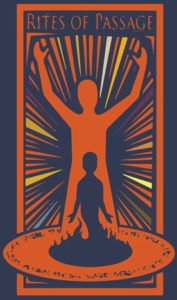 I resonate with his line that depression is like a rite of passage. Whether my depressions have been the two-year variety or the three-day variety I have discovered the same pattern--that is, that I seem to move through them like a baby in the birth canal. It's uncomfortable, it's cramped, it can be suffocating, and it's scary as hell. Yet every depression has resulted in an emergence into a new world--sometimes significant like a job change or a move and sometimes minute like a slight shift in perspective, giving myself a little more grace, or reminding myself to just calm the hell down.Depression and anxiety can be very scary. I know. They have been irregular visitors in my life for nearly thirty years. But I am learning to treat them more like friends being real with me than like viruses attacking my mental health. Either way it hurts. But the latter assumes that when we can cure ourselves of these emotional states we'll return to our former feel good state. The former assumes that we are just being unceremoniously goaded to a new place and a new perspective.None of this negates the need for a good therapist, psychologist and, sometimes, psychiatrist. Believe me, again. I know! But what it does is remind us that depression and anxiety may not be the enemy we often assume. They may be more like the brutally honest friend who invites us to take stock of our lives and make subtle or significant changes.I will not disagree with any therapist who challenges this based on their clinical experience. Nor will I try to convince any person who is currently experiencing depression and/or anxiety to see their disorder in a friendlier light. I will only say this--that every bout with these two characters has led me every time to either a change in my life circumstances or a change in my perspective. Pills have helped, but it wasn't the getting over that finally did it. It was the going through.Depression as a rite of passage? Moore might be on to something here.
I resonate with his line that depression is like a rite of passage. Whether my depressions have been the two-year variety or the three-day variety I have discovered the same pattern--that is, that I seem to move through them like a baby in the birth canal. It's uncomfortable, it's cramped, it can be suffocating, and it's scary as hell. Yet every depression has resulted in an emergence into a new world--sometimes significant like a job change or a move and sometimes minute like a slight shift in perspective, giving myself a little more grace, or reminding myself to just calm the hell down.Depression and anxiety can be very scary. I know. They have been irregular visitors in my life for nearly thirty years. But I am learning to treat them more like friends being real with me than like viruses attacking my mental health. Either way it hurts. But the latter assumes that when we can cure ourselves of these emotional states we'll return to our former feel good state. The former assumes that we are just being unceremoniously goaded to a new place and a new perspective.None of this negates the need for a good therapist, psychologist and, sometimes, psychiatrist. Believe me, again. I know! But what it does is remind us that depression and anxiety may not be the enemy we often assume. They may be more like the brutally honest friend who invites us to take stock of our lives and make subtle or significant changes.I will not disagree with any therapist who challenges this based on their clinical experience. Nor will I try to convince any person who is currently experiencing depression and/or anxiety to see their disorder in a friendlier light. I will only say this--that every bout with these two characters has led me every time to either a change in my life circumstances or a change in my perspective. Pills have helped, but it wasn't the getting over that finally did it. It was the going through.Depression as a rite of passage? Moore might be on to something here.
When God Shudders...
Mystic Mondays (Birthday Delay!) October 17, 2016
I felt a great disturbance in the Force…as if millions of voices suddenly cried out in terror and were suddenly silenced. I fear something terrible has happened. Obi-wan Kenobi in Star Wars
The other morning as I made that foggy transition from sleep into awareness I noticed that my whole body was shaking slightly. It wasn’t the first morning this had happened. In recent weeks it has shown up a handful of times. I recognized it. A few years before during a particularly fragile period of loss and transition I remember it being an almost daily occurrence for a number of weeks. This time, however, I was uncertain of the source and origin. I have a reasonable amount of security as I am just half way through an interim pastorate—meaning that I likely still have 12-18 months of secure employment and there are no major shifts with family and friends. But I have to be honest. It really didn’t take me long to recognize the source. As a preacher and blogger I feel a certain level of responsibility to keep up on what people most care about. And in this particular season it happens to be the tone of politics, the boundaries of public debate, and the future of our country. I knew exactly what was going on—I was internalizing the anxiety that we as a people are feeling and now my body was sending the same message.Therapists are telling us that they are seeing increased levels of anxiety, stress, anger, and helplessness in their clients. Recent disclosures about alleged sexual abuse is triggering PTSD symptoms among thousands (if not more) women around our country. In a recent survey 90% of those surveyed responded that this election was either causing them to be somewhat stressed or very stressed.My body has been telling me, “I feel a great disturbance in the Force as if millions of voices are crying out…”This really gives me a chance to share the deeper message of nurturing a mystical heart toward life. Often (and based on my prior posts) when we talk about mystical experiences we just focus on those experiences where we feel an intimate connection with the Sacred—experiences that we wish we could duplicate on a regular basis such as seeing God’s heart when looking at a sunset or recognizing the face of Christ in a moment of unparalleled kindness.But mysticism isn’t just about the moments of ecstatic beauty and goodness. At its heart mysticism is about allowing our soul to feel the very pulse of Life and God. It’s about seeing the Reality under the reality. It’s about tying into the vein of life that runs much deeper than what our eyes can see and our ears can hear. It’s about trusting the wisdom and the truth of the soul—a reality that we often keep hidden or simply aren’t aware of.
But I have to be honest. It really didn’t take me long to recognize the source. As a preacher and blogger I feel a certain level of responsibility to keep up on what people most care about. And in this particular season it happens to be the tone of politics, the boundaries of public debate, and the future of our country. I knew exactly what was going on—I was internalizing the anxiety that we as a people are feeling and now my body was sending the same message.Therapists are telling us that they are seeing increased levels of anxiety, stress, anger, and helplessness in their clients. Recent disclosures about alleged sexual abuse is triggering PTSD symptoms among thousands (if not more) women around our country. In a recent survey 90% of those surveyed responded that this election was either causing them to be somewhat stressed or very stressed.My body has been telling me, “I feel a great disturbance in the Force as if millions of voices are crying out…”This really gives me a chance to share the deeper message of nurturing a mystical heart toward life. Often (and based on my prior posts) when we talk about mystical experiences we just focus on those experiences where we feel an intimate connection with the Sacred—experiences that we wish we could duplicate on a regular basis such as seeing God’s heart when looking at a sunset or recognizing the face of Christ in a moment of unparalleled kindness.But mysticism isn’t just about the moments of ecstatic beauty and goodness. At its heart mysticism is about allowing our soul to feel the very pulse of Life and God. It’s about seeing the Reality under the reality. It’s about tying into the vein of life that runs much deeper than what our eyes can see and our ears can hear. It’s about trusting the wisdom and the truth of the soul—a reality that we often keep hidden or simply aren’t aware of. If mysticism is about being so in touch with the heart beat of God that we can see God smile with delight, it also means that we can feel and tell when God's body shudders. It means that we can tell when the Force that unites us and sustains us is suddenly disturbed like the surface of a glassy still pond suddenly broken by a thrown rock.I am old enough that this is now my tenth presidential election that I have had the privilege to vote in. These elections have been and are hard. The debates can get contentious. Some elections have left me more concerned for our country than others. This democratic process is messy, not always fool proof and sometimes vulnerable to corruption, rigging, and manipulation. It is not and has not been a perfect system. But I have trusted it (even my candidate lost) to honor the deeper principles and spirit of democracy.But never has my body made clear to me in those elections like it has in this one that “there is a great disturbance in the Force.” My nerves are shot. My body trembles. This feels less like democracy and more like war.I am quite sure that what we are feeling is a great shudder by God. A disturbance in the Force. A rock violently thrown into a perfectly still sacred pond.When we see God smiling we cannot help but to share the joy of that experience with others. And when we feel God shuddering we cannot help but to do what? What are called to do? How do we respond? How do we reassure God that we have it under control? How do we let God know that it will all be okay?
If mysticism is about being so in touch with the heart beat of God that we can see God smile with delight, it also means that we can feel and tell when God's body shudders. It means that we can tell when the Force that unites us and sustains us is suddenly disturbed like the surface of a glassy still pond suddenly broken by a thrown rock.I am old enough that this is now my tenth presidential election that I have had the privilege to vote in. These elections have been and are hard. The debates can get contentious. Some elections have left me more concerned for our country than others. This democratic process is messy, not always fool proof and sometimes vulnerable to corruption, rigging, and manipulation. It is not and has not been a perfect system. But I have trusted it (even my candidate lost) to honor the deeper principles and spirit of democracy.But never has my body made clear to me in those elections like it has in this one that “there is a great disturbance in the Force.” My nerves are shot. My body trembles. This feels less like democracy and more like war.I am quite sure that what we are feeling is a great shudder by God. A disturbance in the Force. A rock violently thrown into a perfectly still sacred pond.When we see God smiling we cannot help but to share the joy of that experience with others. And when we feel God shuddering we cannot help but to do what? What are called to do? How do we respond? How do we reassure God that we have it under control? How do we let God know that it will all be okay?
Salvation is a Duet!
Mystic Mondays October 10, 2016"We are co-workers with God. The mystery of salvation is a duet, not a solo."That was a line from the Greek Orthodox Diocese of America in an essay titled, "How Are We Saved?" The link was included by reader, Carl, from last week's post as I teased out one of the differences between our traditional Western Christian faith and Eastern Orthodox faith--that is that Orthodox Christianity seems to have a thinner veil of separation between heaven and earth than we do in the West. I told someone the other day that I felt like I had just discovered a long lost grandmother from an ancient past. I certainly discovered her through a rather circuitous path. Feeling somewhat dissatisfied with a religious tradition (Presbyterianism) that is weighted toward the powers of the mind, but gets nervous around passion, soul and body I went out in search for a spirituality that satisfied this deeper longing. I had read just enough of Rumi's poetry to recognize what I was missing. His poetry dripped with the language of a steamy love affair with God, an experience that I was having more and more often in recent years.On an intuitive lark I flew across the Atlantic Ocean, unloaded my bicycle in Rome and rode across three countries--Italy, Greece and Turkey before arriving at Rumi's Tomb in Konya, Turkey. It was there in Greece and Turkey that I experienced in the people, the culture, the music and the religion a taste of the embodied spirituality I was looking for. But the greater gift of the trip turned out to be my exposure to Orthodox Christianity--a long lost grandmother I didn't even know I had.This fall I began facilitating the BBC series on The History of Christianity--a series I had taught in 2011 in another church. But this time as they led us through Istanbul and the great Hagia Sophia (Church of the Holy Wisdom) I wasn't just getting a history lesson. I had been there myself in the interim between the two times I taught this class. Now the words from the narrator were matching my actual experience. I had heard the words before that the priests of the East were more poets and artists than philosophers, but those words slipped right by me in 2011. This time, after following the bread crumbs to Rumi and cycling through Orthodox Greece and Muslim Turkey, I heard the words and went "Aha! I get it!"
I told someone the other day that I felt like I had just discovered a long lost grandmother from an ancient past. I certainly discovered her through a rather circuitous path. Feeling somewhat dissatisfied with a religious tradition (Presbyterianism) that is weighted toward the powers of the mind, but gets nervous around passion, soul and body I went out in search for a spirituality that satisfied this deeper longing. I had read just enough of Rumi's poetry to recognize what I was missing. His poetry dripped with the language of a steamy love affair with God, an experience that I was having more and more often in recent years.On an intuitive lark I flew across the Atlantic Ocean, unloaded my bicycle in Rome and rode across three countries--Italy, Greece and Turkey before arriving at Rumi's Tomb in Konya, Turkey. It was there in Greece and Turkey that I experienced in the people, the culture, the music and the religion a taste of the embodied spirituality I was looking for. But the greater gift of the trip turned out to be my exposure to Orthodox Christianity--a long lost grandmother I didn't even know I had.This fall I began facilitating the BBC series on The History of Christianity--a series I had taught in 2011 in another church. But this time as they led us through Istanbul and the great Hagia Sophia (Church of the Holy Wisdom) I wasn't just getting a history lesson. I had been there myself in the interim between the two times I taught this class. Now the words from the narrator were matching my actual experience. I had heard the words before that the priests of the East were more poets and artists than philosophers, but those words slipped right by me in 2011. This time, after following the bread crumbs to Rumi and cycling through Orthodox Greece and Muslim Turkey, I heard the words and went "Aha! I get it!"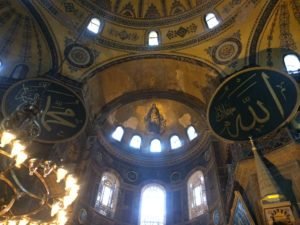 And the discoveries just keep coming. I read through the essay that Carl forwarded from the Greek Orthodox Diocese. At first it read very much like the orthodoxy associated with the history of the Western Church. There was an ancient feel to it in much the same way that reading the Westminster Catechism from the 17th century feels. And then suddenly there it was:
And the discoveries just keep coming. I read through the essay that Carl forwarded from the Greek Orthodox Diocese. At first it read very much like the orthodoxy associated with the history of the Western Church. There was an ancient feel to it in much the same way that reading the Westminster Catechism from the 17th century feels. And then suddenly there it was:
We are co-workers with God. The mystery of salvation is a duet, not a solo."
I laughed out loud. Thirty years ago I was reading cutting edge theology in seminary. One of the most intriguing was this "new" concept that was being called the "co-creative" model of humanity's relationship to God. The premise was, in contradiction to the omnipotent models of God, that God cannot act without humanity and humanity cannot act without God. The old language of obeying God was out; the new language of being a partner with God was in. God was not shouting orders to us from the Trump Tower, but was in the streets pushing the brooms with us. "Salvation is a duet."I was struck once again that this "new" thing that we are discovering is really just a very old thing. While I was all excited by the new theology coming out in the 1980's the Greek Orthodox Church was quietly practicing and living out a similar theology and had been for over a thousand years. The truth is that what we have been doing isn't so much brand new, cutting edge, and modern. The truth is we in the West were just a little late to the party!Two years ago I rode my bike from Rome to Konya (I like to title it "From Rome to Rumi") feeling like I was riding into the future of an emerging spirituality. I was pioneering my way into a fresh new spirituality. I have a hunch that I am not teasing out the future at all. I am just discovering a long lost grandmother that I never knew I had.This could get really fun and exciting!
Is This Heaven?
Mystic Mondays October 3, 2016
Heaven is not a far off hope, but a present reality right here on earth.
I wrote those words in my last Mystic Monday post as I pondered the implications of the faith of our Orthodox brothers and sisters and their belief that life is a mysterious dance between the human and her partner, the divine. One reader, Roy, admitted, "Brian, I'm confused. (If this is true then) what do we have to look forward to after we die?" I promised this reader that the next post would be my answer to him. Here it is:Dear Roy,Great question! In fact, the question itself reveals the exact point that I am trying to make. I take the risk of making a gross generalization between typical Western Christianity and the mysticism of Eastern Orthodox Christianity, but I think it's worth drawing the distinction in order to answer your question.Both Western Christianity and Eastern Christian mysticism concern themselves with the subjects of heaven and earth, heaven and hell, and life and death. But Western Christianity draws thicker lines between heaven and earth and life and death. Western Christianity tends to associate this earthly life with the presence of sin (and the doctrine of original sin) and trials and tribulations. Heaven is not something that is hidden underneath the veil of earthly existence, but a reality that we get like a Christmas present if we have been more good than naughty. Western Christianity is very concerned (and often anxious) about what happens after death. And rightly so. We worry about what life will be like after marriage, the birth of children, divorce, retirement, etc. But with those we at least have the benefit of seeing others who have survived those tricky stages and have lived to tell about it. Death appears to be just a little more final and so far no one has come back to tell us, "Guess what? The water is fine!" So, it's no wonder we give so much eternal worry to the subject of death.Eastern mysticism also acknowledges the presence and finality of death. But those traditions that nurture a more mystical lens tend to give very little credibility to the power of death. The mystical traditions believe that God is both the God of life and of death. In fact the Brief Statement of Faith that was adopted by the Presbyterian Church (USA) in 1983 begins with these words, "In life and in death we belong to God." A mystic would nod in approval at that sentiment.You see, we tend to make a big deal about life on this side of the grave and life on the other side of the grave. Mystics tend to trust that the God who put all of this in motion, the God who created the magic of the seasons, the God who could transform a caterpillar into a butterfly, and the God who can create a mighty oak out of a rotting seed is a God who knows what She is doing when a human life is extinguished. Mystics tend to think more like the Ecclesiastical poet who wrote,
Western Christianity is very concerned (and often anxious) about what happens after death. And rightly so. We worry about what life will be like after marriage, the birth of children, divorce, retirement, etc. But with those we at least have the benefit of seeing others who have survived those tricky stages and have lived to tell about it. Death appears to be just a little more final and so far no one has come back to tell us, "Guess what? The water is fine!" So, it's no wonder we give so much eternal worry to the subject of death.Eastern mysticism also acknowledges the presence and finality of death. But those traditions that nurture a more mystical lens tend to give very little credibility to the power of death. The mystical traditions believe that God is both the God of life and of death. In fact the Brief Statement of Faith that was adopted by the Presbyterian Church (USA) in 1983 begins with these words, "In life and in death we belong to God." A mystic would nod in approval at that sentiment.You see, we tend to make a big deal about life on this side of the grave and life on the other side of the grave. Mystics tend to trust that the God who put all of this in motion, the God who created the magic of the seasons, the God who could transform a caterpillar into a butterfly, and the God who can create a mighty oak out of a rotting seed is a God who knows what She is doing when a human life is extinguished. Mystics tend to think more like the Ecclesiastical poet who wrote,
To everything there is a season and a time for every matter under heaven: a time to be born and a time to die.
The mystical wings of our religious traditions also believe that there is a heavenly life that is far more beautiful, peaceful, just, loving and fulfilling than this earthly life that we typically see and experience. The difference between the Western Church and the Eastern Church is that in the West we tend to see heaven as a future reality only accessible after death and in the East heaven is a deeper reality that is accessible now. The former distinguishes between two very different realities--life and death. The latter sees only one reality--life with God--a life that not even death can put a wrinkle in. I am reminded of the scene in Field of Dreams when John Kinsella asks his son, Ray Kinsella (played by Kevin Costner) while standing out in the middle of a baseball field created by the clearing of a corn crop, "Is this heaven?" To which Ray responds, "No, this is Iowa." John looks around again and shakes his head and says, "Iowa? I could have sworn this was heaven."Maybe heaven isn't a place that we one day get to, but a place that reveals itself when we are ready to see it. Maybe we don't have to die to get to heaven. Maybe all we have to do is to live, really live.
I am reminded of the scene in Field of Dreams when John Kinsella asks his son, Ray Kinsella (played by Kevin Costner) while standing out in the middle of a baseball field created by the clearing of a corn crop, "Is this heaven?" To which Ray responds, "No, this is Iowa." John looks around again and shakes his head and says, "Iowa? I could have sworn this was heaven."Maybe heaven isn't a place that we one day get to, but a place that reveals itself when we are ready to see it. Maybe we don't have to die to get to heaven. Maybe all we have to do is to live, really live.
Pioneering Our Way Back to Old Time Religion
Mystic Mondays September 26, 2016Twenty three years ago I stood before our presbytery in defense of my Statement of Faith. It's a historic tradition in the church to defend orthodoxy (that is, the beliefs that fit in the church's theological box). At its lowest point those who could not defend and promote orthodox beliefs were burned at the stake. Most often, however, it just meant excommunication from the community, which, in those days was often just a slow death sentence. Today, if a candidate for membership in a church body can't pass the orthodoxy test it just means that they find a church that better reflects their possibly unorthodox beliefs. These days there's a church for everybody!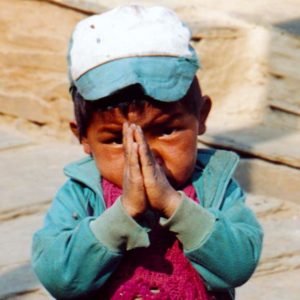 Twenty three years ago the orthodoxy police noticed something in my Statement of Faith that made them nervous. It was clear that when it came to the doctrine of the incarnation (that Jesus was fully human and fully divine) that I leaned heavily on the fully human side. I said, "Jesus was fully human and thus fully divine, manifested in his full commitment to compassion, healing, justice and peace."Some in the presbytery found it wonderfully refreshing as I discarded any references to Jesus divinity as somehow being above and separate from his humanity. But others were very nervous that I was driving my theological care right on the edge of a cliff called Arianism--an early heresy of the church that denied Jesus divinity and celebrated his humanity and his unique and intimate relationship with God. I took questions while shaking in my shoes knowing that my professional future was at stake. I wasn't going to be burned at the stake (it was raining outside anyway), but my livelihood was in jeopardy.In the end I found my way through, although at the time I felt that I had chickened out a bit. I told them that it wasn't that I didn't affirm the divinity of Jesus as much as I felt the need to get the pendulum to swing back more toward his humanity after centuries of highlighting his divinity at the cost of his humanity. Today my thinking on this is much more sophisticated and I wished that I could have defended my thesis with more depth than I did. At the same time I was glad that I had the intuitive sense to find a way to defend my nod to Jesus humanity while allaying the fears of those who were thinking that Arius had just been resurrected in their presence!
Twenty three years ago the orthodoxy police noticed something in my Statement of Faith that made them nervous. It was clear that when it came to the doctrine of the incarnation (that Jesus was fully human and fully divine) that I leaned heavily on the fully human side. I said, "Jesus was fully human and thus fully divine, manifested in his full commitment to compassion, healing, justice and peace."Some in the presbytery found it wonderfully refreshing as I discarded any references to Jesus divinity as somehow being above and separate from his humanity. But others were very nervous that I was driving my theological care right on the edge of a cliff called Arianism--an early heresy of the church that denied Jesus divinity and celebrated his humanity and his unique and intimate relationship with God. I took questions while shaking in my shoes knowing that my professional future was at stake. I wasn't going to be burned at the stake (it was raining outside anyway), but my livelihood was in jeopardy.In the end I found my way through, although at the time I felt that I had chickened out a bit. I told them that it wasn't that I didn't affirm the divinity of Jesus as much as I felt the need to get the pendulum to swing back more toward his humanity after centuries of highlighting his divinity at the cost of his humanity. Today my thinking on this is much more sophisticated and I wished that I could have defended my thesis with more depth than I did. At the same time I was glad that I had the intuitive sense to find a way to defend my nod to Jesus humanity while allaying the fears of those who were thinking that Arius had just been resurrected in their presence!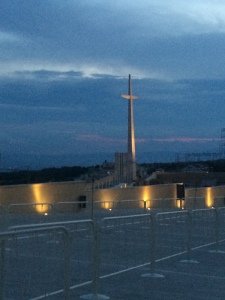 I share this little vignette because these memories are coming back as I move more and more into this exploration of our ancient mystical traditions. Twenty three years ago I had no idea what I was doing or saying except that in my heart of hearts I knew that my understanding of Jesus divinity only came through my experience of his humanity. There was no divinity apart from his humanity. What made him divine (if we accept our creedal formulations) was his capacity to live fully into the human drama and predicament even at the cost of death on a cross. This stuff is not for sissies!This past week I had it confirmed again. I was facilitating the class on BBC's The History of Christianity by Diarmaid MacCulloch. We were reviewing the nearly 1000-year history of the Orthodox Christian Church that had split from the Roman Catholic Church in 1054 C.E. (Common Era). There is so much I can share about this, but the one thing that struck me was that Roman Catholicism (and later Protestantism) were largely shaped by the idea of original sin and the Orthodox Church was shaped by the idea of original blessing (a term coined by Matthew Fox, a former Catholic priest).The big difference is this. In the West we start with the idea that humanity is fallen and it takes a savior to redeem us to divine favor. We can become divine, but only through an intermediary who washes away our sins. In the East the assumption is that humanity and divinity are in a playful dance with each other and manifested in nature, art, music, drama and even humans themselves! Religion is not about redeeming us from sin, but about opening up the portals to see the divine within the created order. Heaven is not a far off hope, but a present reality right here on earth.
I share this little vignette because these memories are coming back as I move more and more into this exploration of our ancient mystical traditions. Twenty three years ago I had no idea what I was doing or saying except that in my heart of hearts I knew that my understanding of Jesus divinity only came through my experience of his humanity. There was no divinity apart from his humanity. What made him divine (if we accept our creedal formulations) was his capacity to live fully into the human drama and predicament even at the cost of death on a cross. This stuff is not for sissies!This past week I had it confirmed again. I was facilitating the class on BBC's The History of Christianity by Diarmaid MacCulloch. We were reviewing the nearly 1000-year history of the Orthodox Christian Church that had split from the Roman Catholic Church in 1054 C.E. (Common Era). There is so much I can share about this, but the one thing that struck me was that Roman Catholicism (and later Protestantism) were largely shaped by the idea of original sin and the Orthodox Church was shaped by the idea of original blessing (a term coined by Matthew Fox, a former Catholic priest).The big difference is this. In the West we start with the idea that humanity is fallen and it takes a savior to redeem us to divine favor. We can become divine, but only through an intermediary who washes away our sins. In the East the assumption is that humanity and divinity are in a playful dance with each other and manifested in nature, art, music, drama and even humans themselves! Religion is not about redeeming us from sin, but about opening up the portals to see the divine within the created order. Heaven is not a far off hope, but a present reality right here on earth.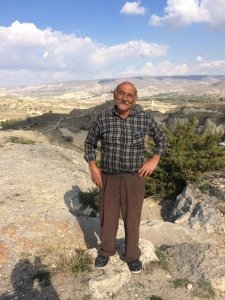 I am just struck by this intuitive journey that I have travelled that began many years ago. It first started with a paper on the "Death of God" where I agreed with those radical 60's theologians that the images we have used for God would likely need to die before the Church could be reformed again. That followed my Statement of Faith defenses where I had made a nod to the humanity of Jesus and found myself on the theological hot seat. I have teased these ideas out over the years in sermons, but it was when my soul cried out, "Go to Turkey, visit the land of Rumi" that my intuitive hunches started to find an historical basis. It's all starting to come together.I am suddenly thinking, "I need to take people to Istanbul and to Konya (Rumi's Tomb) and to Thessaloniki, Greece"--all places where this ancient mystical impulse is rooted in the people, the land, the traditions and the history.It's funny. We are often talk about the new spiritualities that are emerging in the West as if were discovering new worlds. I actually don't think they are new at all. In fact, they are old, really old. I am starting to believe that we aren't breaking new ground here at all. We may be just healing a 1000 year old split in our Christian family. We may be just coming home, finally coming home.
I am just struck by this intuitive journey that I have travelled that began many years ago. It first started with a paper on the "Death of God" where I agreed with those radical 60's theologians that the images we have used for God would likely need to die before the Church could be reformed again. That followed my Statement of Faith defenses where I had made a nod to the humanity of Jesus and found myself on the theological hot seat. I have teased these ideas out over the years in sermons, but it was when my soul cried out, "Go to Turkey, visit the land of Rumi" that my intuitive hunches started to find an historical basis. It's all starting to come together.I am suddenly thinking, "I need to take people to Istanbul and to Konya (Rumi's Tomb) and to Thessaloniki, Greece"--all places where this ancient mystical impulse is rooted in the people, the land, the traditions and the history.It's funny. We are often talk about the new spiritualities that are emerging in the West as if were discovering new worlds. I actually don't think they are new at all. In fact, they are old, really old. I am starting to believe that we aren't breaking new ground here at all. We may be just healing a 1000 year old split in our Christian family. We may be just coming home, finally coming home.
Poet Priests
Mystic Mondays September 19, 2016I was talking with my website and business consultant from Wild Ginger Press this past week about the intuitive and almost impulsive decision to ride from Rome to Konya, Turkey in the fall of 2014. I was explaining how surprised I was that what I discovered on that pilgrimage is playing itself out in our churches and communities. Bobbi quickly inserted, "Oh yeah, Brian, I remember when you decided to do it and you said, 'I don't why I need to do this, but I feel like I need to ride from Rome to Rumi's Tomb in Turkey. It has something to do with the move from institutional religion to the language of mysticism.'" This conversation came up because I had a major confirmation this week. I am currently facilitating a six-week class on The History of Christianity at the church where I am serving. We are watching a wonderful DVD set that was produced by BBC and narrated by church historian Dairmaid McCulloch. In the first episode Dairmaid visited Syria to tell the story of the Orthodox churches that had thrived in the first few centuries after Christ. He was talking to a Syrian priest about the religious differences between East and West when he asked, "What is it that you think is missing in the West?" The priest from the Syrian Orthodox Church gave a very concise answer that hit me like a strike of lightning.
This conversation came up because I had a major confirmation this week. I am currently facilitating a six-week class on The History of Christianity at the church where I am serving. We are watching a wonderful DVD set that was produced by BBC and narrated by church historian Dairmaid McCulloch. In the first episode Dairmaid visited Syria to tell the story of the Orthodox churches that had thrived in the first few centuries after Christ. He was talking to a Syrian priest about the religious differences between East and West when he asked, "What is it that you think is missing in the West?" The priest from the Syrian Orthodox Church gave a very concise answer that hit me like a strike of lightning.
"In the West your theologians are philosophers. In the East our theologians are poets and iconographers (artists)."
I knew immediately that what my head could not tell me my soul had already known. I had cycled from Catholic Italy, through Orthodox Greece, and into Muslim Turkey in search of a spirituality, a religious tradition that more closely mirrored the reality of my soul.Every pastor in the Presbyterian tradition has to write a statement of faith as part of the ordination trials for entrance into the profession. My earliest statements of faith relied on good theological philosophy. There was a rationality to them even in attempting to explain the relationship between God, Jesus and Spirit (as if the Trinity could be rationally explained!). I made logical connections and used the "If this is so, that must be so..." types of arguments.But in 2005 I threw out my old statements of faith. They bored me. They were air-tight rational explanations, but they didn't make my heart sing. I no longer thought about God through the powers of my mind, but experienced God through the softness of my heart. God was no longer to be explained, but to be experienced. I rewrote my statement of faith as poetry. Here is the first stanza:
In the beginning was the Word…pulsating, thriving, exploding;a world birthed, a world coming into being,rocks and seas and blossoming trees,the winged, the legged, and the scaledanimating and revealing the divine artistry of her Maker.
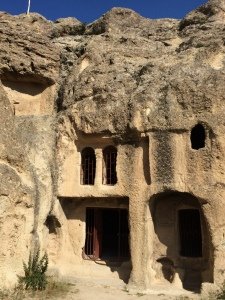 I am struck by the Syrian priest's comment and my come-to-Jesus revelation that the distinct difference between theologians of the West and the East is the difference one gets when one approaches religion through the lens of philosophy compared to poetry and the arts. It was the poetry of Rumi that first drew me to Turkey although I literally had only read a dozen or fewer of his poems. I just knew that my soul wanted more.I wonder if the philosopher theologian is no longer as satisfying to today's people as it is to me. We can describe God. We can elucidate on the exact relationship between Jesus and God. We can draw lines that connect divine entities and boxes that contain all the various descriptions of God. But even if we get it all right, even if our definitions are picture perfect will that be enough to satisfy the hungry soul? Will that be enough to heal the hurting heart? Will that be enough to quench the thirst of the spiritually yearning?The pastor as poet? The priest as artist? The minister as musician?Do our Syrian Orthodox friends know something we don't?
I am struck by the Syrian priest's comment and my come-to-Jesus revelation that the distinct difference between theologians of the West and the East is the difference one gets when one approaches religion through the lens of philosophy compared to poetry and the arts. It was the poetry of Rumi that first drew me to Turkey although I literally had only read a dozen or fewer of his poems. I just knew that my soul wanted more.I wonder if the philosopher theologian is no longer as satisfying to today's people as it is to me. We can describe God. We can elucidate on the exact relationship between Jesus and God. We can draw lines that connect divine entities and boxes that contain all the various descriptions of God. But even if we get it all right, even if our definitions are picture perfect will that be enough to satisfy the hungry soul? Will that be enough to heal the hurting heart? Will that be enough to quench the thirst of the spiritually yearning?The pastor as poet? The priest as artist? The minister as musician?Do our Syrian Orthodox friends know something we don't?
Tasting the Mystical Honey
Mystic Mondays September 12, 2016I had a small window last week hiking up Mt. McLoughlin (elev. 9495 ft.) in Southern Oregon where I felt very in sync with the mountain. We were two separate entities, yet we were engaged in a delightful and playful rhythm, not unlike making love. The totality of the hike lasted nearly eight hours, but for a stretch of about thirty minutes neither I nor the mountain had the upper hand.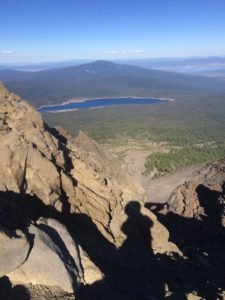 In that brief window my breathing was rapid, but not labored, my pulse was up, but not racing. My mind had gone blank and all that was before me were the boulders I was negotiating my way over, the steep drop offs a few feet away and the sound of my raspy breathing and pounding heart. It was just me and the mountain and not a single other thought.I highlight this because, in contrast, the rest of the hike was a completely different experience. The first three hours were more like exercise as if I was on a God-sized treadmill. My body was stronger than the mountain required and I kept a rapid pace. I was enjoying the mountain, but I was not partnered with the mountain as I had felt in that brief glorious window further up. Then the tables turned. If I had been the stronger one on the way up, the mountain was clearly winning the battle on the way down. The steep descent required a different set of muscles that hadn't been taxed in years. It wasn't long before I was aware of every painful step, the twinges that were turning into cramps and the signs of dehydration. The mountain had suddenly become very cruel.
In that brief window my breathing was rapid, but not labored, my pulse was up, but not racing. My mind had gone blank and all that was before me were the boulders I was negotiating my way over, the steep drop offs a few feet away and the sound of my raspy breathing and pounding heart. It was just me and the mountain and not a single other thought.I highlight this because, in contrast, the rest of the hike was a completely different experience. The first three hours were more like exercise as if I was on a God-sized treadmill. My body was stronger than the mountain required and I kept a rapid pace. I was enjoying the mountain, but I was not partnered with the mountain as I had felt in that brief glorious window further up. Then the tables turned. If I had been the stronger one on the way up, the mountain was clearly winning the battle on the way down. The steep descent required a different set of muscles that hadn't been taxed in years. It wasn't long before I was aware of every painful step, the twinges that were turning into cramps and the signs of dehydration. The mountain had suddenly become very cruel.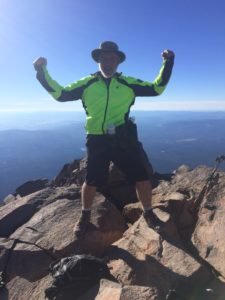 But this blog is not about conquering that mountain that day or being conquered by it. It's not about biting off more than I could chew and paying for it for the next three days where I looked like a 90-year old man getting out of a chair. This blog is about that unique window just before the top where my legs, my lungs, my body and the terrain all seemed to be in a sacred rhythm.I am writing about this because in recent weeks I have become concerned that I am writing about experiences that others may have not have had and thus risking the perception of a sort of spiritual superiority for those who have had these mystical moments. I had one reader write that he had often felt a deep and rich sense of awe and wonder, often while singing, but didn't think they had ever qualified as being mystical.In remember in seminary that we were cautioned that one of the heresies was the promotion of a sort of secret spiritual knowledge where you either were in on it or you weren't. Those who had been blessed with this knowledge (or experience) were part of an exclusive club. I don't ever want to share my experiences in a way that separates me from others; I want to share them in a way that invites people into a deeper, fuller, more intimate love affair with life.
But this blog is not about conquering that mountain that day or being conquered by it. It's not about biting off more than I could chew and paying for it for the next three days where I looked like a 90-year old man getting out of a chair. This blog is about that unique window just before the top where my legs, my lungs, my body and the terrain all seemed to be in a sacred rhythm.I am writing about this because in recent weeks I have become concerned that I am writing about experiences that others may have not have had and thus risking the perception of a sort of spiritual superiority for those who have had these mystical moments. I had one reader write that he had often felt a deep and rich sense of awe and wonder, often while singing, but didn't think they had ever qualified as being mystical.In remember in seminary that we were cautioned that one of the heresies was the promotion of a sort of secret spiritual knowledge where you either were in on it or you weren't. Those who had been blessed with this knowledge (or experience) were part of an exclusive club. I don't ever want to share my experiences in a way that separates me from others; I want to share them in a way that invites people into a deeper, fuller, more intimate love affair with life.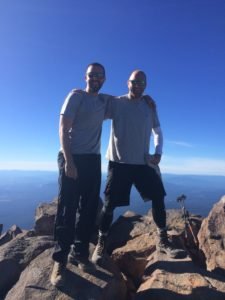 I know that I run the risk of painting the picture of some exclusive club of mystics the more that I talk about this. Yet I also know that I cannot deny my actual experience. This past week on Mt. McLoughlin is a case in point. I know that something happened in that small window when the mountain had pushed me to my limit, but before it had broken me. For thirty minutes I was perfectly in rhythm with the mountain. We were two lovers exploring each other, testing each other, and taking turns giving each other pleasure. I was taught that rocks are inanimate objects, but I truly believed that day that the rocks were enjoying me as much as I was enjoying them.I think what is happening is that I am finding my own way into meditation. I have never been successful at the sitting-cross-legged-while humming-ohm-type of meditation that is supposed to produce a trance-like state at some point. My mind wanders too easily. I get fidgety. And my body rebels against the posture. The only time I entered this deep state while sitting was an occasion where I was singing a repeated Taize chorus. We sang it over and over again for nearly a half hour and when it was time to end the singing I couldn't. The song had become part of my body and it took me four or five more verses until I could ease my way back out as if I was a diver slowly surfacing from the deeps.I just read an article that the practice of the Whirling Dervishes of Sufi Islam is catching on among Jews as well as people of the West. Two years ago I sat and watched (marveled, actually) as Whirling Dervishes performed in Istanbul. Honestly, I am quite sure that I would get dizzy and vomit if I did what they did twirling in the same direction for nearly an hour at a time. But it is said that the practice puts them into a deep trance-like mystical state that results in a transformed heart and a deeper love for humanity.I know that all sounds weird to our Western rationalistic minds, but I think there is something to this. I had my first experience of this mystical awareness about twenty years ago and have had it repeated a number of times since then (in fact, it is happening more often as if it is something one can practice). But I am noticing a pattern with myself. These mystical experiences have always occurred in relationship to rhythm--either a body rhythm or a musical rhythm. Maybe I'll just call it the "rhythm method" for kicks.
I know that I run the risk of painting the picture of some exclusive club of mystics the more that I talk about this. Yet I also know that I cannot deny my actual experience. This past week on Mt. McLoughlin is a case in point. I know that something happened in that small window when the mountain had pushed me to my limit, but before it had broken me. For thirty minutes I was perfectly in rhythm with the mountain. We were two lovers exploring each other, testing each other, and taking turns giving each other pleasure. I was taught that rocks are inanimate objects, but I truly believed that day that the rocks were enjoying me as much as I was enjoying them.I think what is happening is that I am finding my own way into meditation. I have never been successful at the sitting-cross-legged-while humming-ohm-type of meditation that is supposed to produce a trance-like state at some point. My mind wanders too easily. I get fidgety. And my body rebels against the posture. The only time I entered this deep state while sitting was an occasion where I was singing a repeated Taize chorus. We sang it over and over again for nearly a half hour and when it was time to end the singing I couldn't. The song had become part of my body and it took me four or five more verses until I could ease my way back out as if I was a diver slowly surfacing from the deeps.I just read an article that the practice of the Whirling Dervishes of Sufi Islam is catching on among Jews as well as people of the West. Two years ago I sat and watched (marveled, actually) as Whirling Dervishes performed in Istanbul. Honestly, I am quite sure that I would get dizzy and vomit if I did what they did twirling in the same direction for nearly an hour at a time. But it is said that the practice puts them into a deep trance-like mystical state that results in a transformed heart and a deeper love for humanity.I know that all sounds weird to our Western rationalistic minds, but I think there is something to this. I had my first experience of this mystical awareness about twenty years ago and have had it repeated a number of times since then (in fact, it is happening more often as if it is something one can practice). But I am noticing a pattern with myself. These mystical experiences have always occurred in relationship to rhythm--either a body rhythm or a musical rhythm. Maybe I'll just call it the "rhythm method" for kicks. Please forgive me if I start sounding like I am promoting an exclusive club and an exclusive experience. I certainly don't mean to. It's just that I know something is happening and there is something to this experience. I have tasted something that I can't help but to share with others.This summer at Ghost Ranch Conference Center in New Mexico I had the privilege of listening to two Sufi musicians perform for a small gathering of us. As they prepared to sing one of their hypnotic songs the man explained, "Mysticism is a little like tasting honey. You can try to describe it. You can say that it is sweet and sticky. But until you actually taste it you don't really know honey."I am quite sure that life has allowed me dip my finger in the mystical honey. I can't but help to share it with you as well!
Please forgive me if I start sounding like I am promoting an exclusive club and an exclusive experience. I certainly don't mean to. It's just that I know something is happening and there is something to this experience. I have tasted something that I can't help but to share with others.This summer at Ghost Ranch Conference Center in New Mexico I had the privilege of listening to two Sufi musicians perform for a small gathering of us. As they prepared to sing one of their hypnotic songs the man explained, "Mysticism is a little like tasting honey. You can try to describe it. You can say that it is sweet and sticky. But until you actually taste it you don't really know honey."I am quite sure that life has allowed me dip my finger in the mystical honey. I can't but help to share it with you as well!
Play Me, Play Me, Play Me!
Mystic Mondays August 29, 2016You are the sun. I am the moon.You are the words. I am the tune.Play me. Neil Diamond
I was reminded in a response to my post last week (which I'll publish in coming weeks) that many people discover their mystical experiences in the intimacy of relationships as much as in nature.I remember when I was teaching a class on Christian mysticism nearly ten years ago that I asked about where people had experienced those moments when the veil between heaven and earth had been lifted. Most related experiences in nature. But one woman who had to have been considered one of the more religiously devout in the congregation shared something different. She said that it was in the frequent visits she made to members and friends who were isolated in nursing homes. That intimate time of prayer and touching was when she felt God most near. Immediately the mysticism of Mother Teresa came to mind as she often spoke of seeing the face of Christ on every dying patient she worked with in her Missionaries of Charity organization. I often speak of those sacred encounters that I have when I am immersed in a canopied forest hiking or cycling along a stream on a perfect day. But I recognize that while I and many people are rediscovering the mystical impulse of God in nature that it is not limited to the dirt, the sky, and the sun that bless us every day. In fact, I do wonder if the focus on nature these days is simply a reaction to the perception that God is supposed to be found in a building on Sunday morning at 10 a.m. In some ways the hyper-focus on rediscovering God in the good Earth may say less about mysticism and more about one of the liabilities of the church.Mysticism isn't really about nature exclusively. It's about connection and oneness and the dissolving away of the lines between heaven and earth. It's about seeing life as a dance and a love affair between the human and her partner, the divine.Neil Diamond captures this mystical quality in his tender love song, "Play Me" as he writes, "You are the sun. I am the moon. You are the words. I am the tune. Play me." More than just beautiful poetry that is supposed to make every woman's knees buckle, Diamond, in just a few words, writes a complete description of the mystical experience of being in relationship. No two hundred page self help book could say it any better or more completely.
I often speak of those sacred encounters that I have when I am immersed in a canopied forest hiking or cycling along a stream on a perfect day. But I recognize that while I and many people are rediscovering the mystical impulse of God in nature that it is not limited to the dirt, the sky, and the sun that bless us every day. In fact, I do wonder if the focus on nature these days is simply a reaction to the perception that God is supposed to be found in a building on Sunday morning at 10 a.m. In some ways the hyper-focus on rediscovering God in the good Earth may say less about mysticism and more about one of the liabilities of the church.Mysticism isn't really about nature exclusively. It's about connection and oneness and the dissolving away of the lines between heaven and earth. It's about seeing life as a dance and a love affair between the human and her partner, the divine.Neil Diamond captures this mystical quality in his tender love song, "Play Me" as he writes, "You are the sun. I am the moon. You are the words. I am the tune. Play me." More than just beautiful poetry that is supposed to make every woman's knees buckle, Diamond, in just a few words, writes a complete description of the mystical experience of being in relationship. No two hundred page self help book could say it any better or more completely.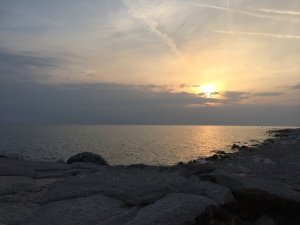 I grew up thinking that such poetic imagery was just that--poetic imagery. "You are the sun. I am the moon," were just fanciful ways to express one's love. Poetry was not literal; it was just a way to make a woman's heart melt. (I wished I had been better at it forty years ago!)I no longer feel that way. When I hear the phrase, "You are the words. I am the tune," I hear an almost literal truth that couldn't be said better any way. How does one capture a love that erases the boundary between one person and another, yet recognizes that the song that they sing together could only be arranged by their differences and individuality? How does one say any better than Neil Diamond did with regard to a full-bodied, soulful, forever commitment, "Play me. Play me. Play me." He says it all. He says I am yours. You are mine. Let's you and I make beautiful music together...because we are the literal song of God!You may think that I am crazy, but the mystic's eyes get opened when poetry no longer is just metaphorical. The heart of the mystic opens up when poetic imagery is not just a literary device to touch the heart. The mystic's world explodes wide open when the sun, the moon, and the words and the tune really are you. Science teaches us that all objects are separate. Our mystical traditions remind us that nothing is separate. All is connected.The mystic believes that love is not really just between two people as if they own the love between them. No, their love is really just a reflection and an expression of the divine love that pulses through all of life.We don't just choose to love as if it is a moral mandate. No, we fall into the divine love and, if we are lucky, we never escape.
I grew up thinking that such poetic imagery was just that--poetic imagery. "You are the sun. I am the moon," were just fanciful ways to express one's love. Poetry was not literal; it was just a way to make a woman's heart melt. (I wished I had been better at it forty years ago!)I no longer feel that way. When I hear the phrase, "You are the words. I am the tune," I hear an almost literal truth that couldn't be said better any way. How does one capture a love that erases the boundary between one person and another, yet recognizes that the song that they sing together could only be arranged by their differences and individuality? How does one say any better than Neil Diamond did with regard to a full-bodied, soulful, forever commitment, "Play me. Play me. Play me." He says it all. He says I am yours. You are mine. Let's you and I make beautiful music together...because we are the literal song of God!You may think that I am crazy, but the mystic's eyes get opened when poetry no longer is just metaphorical. The heart of the mystic opens up when poetic imagery is not just a literary device to touch the heart. The mystic's world explodes wide open when the sun, the moon, and the words and the tune really are you. Science teaches us that all objects are separate. Our mystical traditions remind us that nothing is separate. All is connected.The mystic believes that love is not really just between two people as if they own the love between them. No, their love is really just a reflection and an expression of the divine love that pulses through all of life.We don't just choose to love as if it is a moral mandate. No, we fall into the divine love and, if we are lucky, we never escape.
Are You Secretly a Mystic Too?
I open and fill with love and other objects evaporate.All the learning in books stays put on the shelf.Poetry, the dear words and images of song,comes down over me like mountain water.
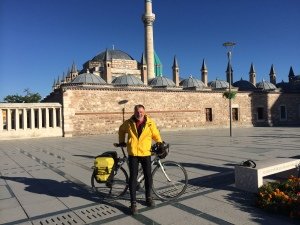 Those words are from Mevlana Rumi's poem, "Roses Underfoot," written nearly eight centuries ago by the beloved Sufi mystic. Two years ago when I cycled to Rumi's Tomb in Konya, Turkey I only had a sophomoric understanding of his mystical poetry. In fact that hasn't changed that much in the time since I returned. What I did have, however, was just enough of a taste of the experience that Rumi was pointing to know that I needed to delve deeper into his life and poetry. Seven weeks and 1500 miles after pedaling out of Rome I cycled into Konya just as the imams were calling people to afternoon prayer. What a rich and soulfully overwhelming experience."I open and fill with love and other objects evaporate." This mysticism thing is an elusive phenomenon, but Rumi captures what I have personally heard from dozens of people: there are experiences where the lines that separate objects disappear; there are moments of such pure ecstasy and connection that the usual distinction between the observer and the observed evaporate into a delicious Oneness; there are times when the Earth seems to stop its rotation, time stops and the entire book of knowledge is opened up before us.And then just as quickly...it is gone. A car horn beeps. An elbow joint cracks. A gust of wind grabs you. And life returns to its mundane normalcy with its usual categories, expectations, and lines of separation and distinction.
Those words are from Mevlana Rumi's poem, "Roses Underfoot," written nearly eight centuries ago by the beloved Sufi mystic. Two years ago when I cycled to Rumi's Tomb in Konya, Turkey I only had a sophomoric understanding of his mystical poetry. In fact that hasn't changed that much in the time since I returned. What I did have, however, was just enough of a taste of the experience that Rumi was pointing to know that I needed to delve deeper into his life and poetry. Seven weeks and 1500 miles after pedaling out of Rome I cycled into Konya just as the imams were calling people to afternoon prayer. What a rich and soulfully overwhelming experience."I open and fill with love and other objects evaporate." This mysticism thing is an elusive phenomenon, but Rumi captures what I have personally heard from dozens of people: there are experiences where the lines that separate objects disappear; there are moments of such pure ecstasy and connection that the usual distinction between the observer and the observed evaporate into a delicious Oneness; there are times when the Earth seems to stop its rotation, time stops and the entire book of knowledge is opened up before us.And then just as quickly...it is gone. A car horn beeps. An elbow joint cracks. A gust of wind grabs you. And life returns to its mundane normalcy with its usual categories, expectations, and lines of separation and distinction.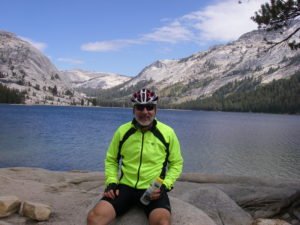 I had my first mind blowing experience of mysticism (of course, I didn't know what to call it back then) twenty years ago at the top of a mountain after climbing a number of miles up a steep and rutted dirt road. As I looked at the valley below me I suddenly got lost in the scenery and for a moment (maybe even a few seconds) I was no longer the observer. I was part of the painting as if a divine artist had planted me right in that spot. God was Van Gogh and I was a single iris in a vase of beautiful delicate irises.Since that time I have experienced this same entrance into a deeper world of soul a number of times--occasionally at Sunday worship when all the elements meld together just right, often on my bicycle as my body and soul come into rhythm together, once as I sang hymns to dying hospice patient.But more importantly than my experiences are your experiences. Since I began sharing my experience nearly a decade ago dozens, if not hundreds of people, have also shared their mystical experiences. I have heard repeatedly, "How come I hadn't heard of this before? I think I have been a mystic my whole life."What really thrills me is that the experience of mysticism hasn't followed any of the religious rules we have come to expect. Evangelical Christians are as likely as progressive Christians to recognize themselves in this language. This has not fallen into the usual conservative and liberal traps--people from both sides are claiming mystical experiences and leanings. What is most exciting is that it has even given us a language to talk with people of other faiths. Our words may be different, but the experience is the same. When both a Muslim and a Christian talk of their love affair with Allah and God, the names of the supreme deity don't get in the way; We know we are speaking of the same love.My experience tells me that what is really needed is a forum for people to share their experiences. Every time I share my experience I hear from five to ten more people about their experience. All I have been doing is providing the language, but you all have been giving me the substance and meat.THIS POST IS AN INVITATION.Over the next few weeks I will collect your responses to the following question and use the Mystic Monday space to share your experiences:Question:
I had my first mind blowing experience of mysticism (of course, I didn't know what to call it back then) twenty years ago at the top of a mountain after climbing a number of miles up a steep and rutted dirt road. As I looked at the valley below me I suddenly got lost in the scenery and for a moment (maybe even a few seconds) I was no longer the observer. I was part of the painting as if a divine artist had planted me right in that spot. God was Van Gogh and I was a single iris in a vase of beautiful delicate irises.Since that time I have experienced this same entrance into a deeper world of soul a number of times--occasionally at Sunday worship when all the elements meld together just right, often on my bicycle as my body and soul come into rhythm together, once as I sang hymns to dying hospice patient.But more importantly than my experiences are your experiences. Since I began sharing my experience nearly a decade ago dozens, if not hundreds of people, have also shared their mystical experiences. I have heard repeatedly, "How come I hadn't heard of this before? I think I have been a mystic my whole life."What really thrills me is that the experience of mysticism hasn't followed any of the religious rules we have come to expect. Evangelical Christians are as likely as progressive Christians to recognize themselves in this language. This has not fallen into the usual conservative and liberal traps--people from both sides are claiming mystical experiences and leanings. What is most exciting is that it has even given us a language to talk with people of other faiths. Our words may be different, but the experience is the same. When both a Muslim and a Christian talk of their love affair with Allah and God, the names of the supreme deity don't get in the way; We know we are speaking of the same love.My experience tells me that what is really needed is a forum for people to share their experiences. Every time I share my experience I hear from five to ten more people about their experience. All I have been doing is providing the language, but you all have been giving me the substance and meat.THIS POST IS AN INVITATION.Over the next few weeks I will collect your responses to the following question and use the Mystic Monday space to share your experiences:Question:
When have you felt so intimately connected to Life/God/the Sacred that usual descriptions evaporate and a delicious Oneness overtakes you?
Guidelines:
- Responses should be no more than 500 words.
- Responses can remain anonymous, by request.
- I reserve the right to weave shorter responses into a longer post of similar experiences.
- If you have pictures to submit please send those as a jpg file.
- Please send submissions to brian@pedalpilgrim.com with the subject line "MM Submission."
- Share this invitation with others you think might want to share their experience. It would be my pleasure to share this space with fellow mystics.
The God of Many Names
Mystic Mondays August 15, 2016 (Vacation Post)Something is happening. And I have a feeling that what I am experiencing is only the “spark that gets the fire going” as the old camp song goes.I have been getting glimpses of this in recent years and with each new sighting I become more convinced that we are watching the future unfold before us.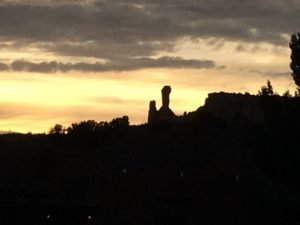 What I am talking about is the growing phenomenon of religious mysticism re-entering our conversations, language, and spiritual experience. This past week I have been enjoying some time at Ghost Ranch, a Presbyterian-affiliated conference center and retreat destination. This is the fourth time I have flown off to Ghost Ranch in the last five years, drawn to the soulful landscapes of this part of northern New Mexico and the creative offerings around spirituality, art, worship, and sacred connection.What has been true each time I have come was especially true this time—Ghost Ranch is less a place to reinforce one’s Presbyterian identity and more a magnet for the cutting edge of American spirituality.It started with a four day singing conference on the Glory to God hymnal of the Presbyterian Church. While that sounds rather traditional, one of the things that came out of our time together was a group consensus: Those of us who have followed the music of the church for the past thirty plus years noticed something. The new hymnal has a new emphasis that points to the re-emergence of religious mysticism. More and more of the songs are written as if they are love letters to God or are about the experience of God’s presence. This is a big deal. We have gone centuries where many of our hymns have been written as ways to teach about the character of God, but don’t capture the intimacy of falling in love with God.I took that new recognition of our shifting Presbyterian tradition with me as I joined a class in progress on spiritual activism. It was there that the song lyrics, “It only takes a spark to get a fire going…” played in my heart. On the first day I sat with a group as we sang along with two Sufi Muslims who have traveled the world playing the music of the Sufi mystics. In the room were Protestants, Catholics, Jews, and Muslims. Despite our various traditions we all sang and swayed to the seductive rhythm of the two talented Muslim musicians as they sang love letters to God.
What I am talking about is the growing phenomenon of religious mysticism re-entering our conversations, language, and spiritual experience. This past week I have been enjoying some time at Ghost Ranch, a Presbyterian-affiliated conference center and retreat destination. This is the fourth time I have flown off to Ghost Ranch in the last five years, drawn to the soulful landscapes of this part of northern New Mexico and the creative offerings around spirituality, art, worship, and sacred connection.What has been true each time I have come was especially true this time—Ghost Ranch is less a place to reinforce one’s Presbyterian identity and more a magnet for the cutting edge of American spirituality.It started with a four day singing conference on the Glory to God hymnal of the Presbyterian Church. While that sounds rather traditional, one of the things that came out of our time together was a group consensus: Those of us who have followed the music of the church for the past thirty plus years noticed something. The new hymnal has a new emphasis that points to the re-emergence of religious mysticism. More and more of the songs are written as if they are love letters to God or are about the experience of God’s presence. This is a big deal. We have gone centuries where many of our hymns have been written as ways to teach about the character of God, but don’t capture the intimacy of falling in love with God.I took that new recognition of our shifting Presbyterian tradition with me as I joined a class in progress on spiritual activism. It was there that the song lyrics, “It only takes a spark to get a fire going…” played in my heart. On the first day I sat with a group as we sang along with two Sufi Muslims who have traveled the world playing the music of the Sufi mystics. In the room were Protestants, Catholics, Jews, and Muslims. Despite our various traditions we all sang and swayed to the seductive rhythm of the two talented Muslim musicians as they sang love letters to God.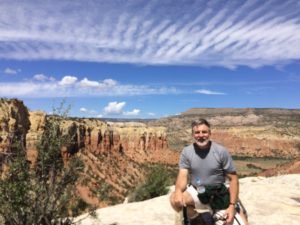 The next day we were treated to a one-hour reading by Mirabai Starr who is famous for her translations of the writings of St. John of the Cross, one of the fathers of Christian mysticism. What was especially quizzical was her description of herself as she opened up her talk. “I am a Mary loving, Jewish, Buddhist, mystic Hindu,” she said. And then added, “It’s been great. No matter where I go everyone can relate to a piece of me.”I share this with you because years ago I served on interfaith councils. We were at the cutting edge of initiating conversations, dialogue, and relationships between religions. But what characterized those councils was the awareness that we were in different places and needed to learn to listen to each other in order to understand each other better and thus create greater harmony between religions and in our world.Something is different now. In the past our different religions were barriers to deep and intimate relationships. We had to work at it to find commonality. Now, those of us exploring the mystical arms of our religions feel like we are brothers and sisters on the same path. We are drinking from the same divine cup. We are experiencing the same life-giving, transforming, loving Presence even if we get there through a variety of different names, spiritual practices, beliefs, and traditions.I have felt it for years. The re-emergence of our mystical traditions may be the medicine that will heal our long-standing divisions, lack of understanding, and distance from each other.I saw it this week at Ghost Ranch. Jew, Christian, Buddhist and Muslim all sat together and all experienced the same intimate Presence. We were tasting the same honey. We were not even interfaith partners. We were just brothers and sisters--all who had fallen in love with the same God, the God of many names.
The next day we were treated to a one-hour reading by Mirabai Starr who is famous for her translations of the writings of St. John of the Cross, one of the fathers of Christian mysticism. What was especially quizzical was her description of herself as she opened up her talk. “I am a Mary loving, Jewish, Buddhist, mystic Hindu,” she said. And then added, “It’s been great. No matter where I go everyone can relate to a piece of me.”I share this with you because years ago I served on interfaith councils. We were at the cutting edge of initiating conversations, dialogue, and relationships between religions. But what characterized those councils was the awareness that we were in different places and needed to learn to listen to each other in order to understand each other better and thus create greater harmony between religions and in our world.Something is different now. In the past our different religions were barriers to deep and intimate relationships. We had to work at it to find commonality. Now, those of us exploring the mystical arms of our religions feel like we are brothers and sisters on the same path. We are drinking from the same divine cup. We are experiencing the same life-giving, transforming, loving Presence even if we get there through a variety of different names, spiritual practices, beliefs, and traditions.I have felt it for years. The re-emergence of our mystical traditions may be the medicine that will heal our long-standing divisions, lack of understanding, and distance from each other.I saw it this week at Ghost Ranch. Jew, Christian, Buddhist and Muslim all sat together and all experienced the same intimate Presence. We were tasting the same honey. We were not even interfaith partners. We were just brothers and sisters--all who had fallen in love with the same God, the God of many names.
